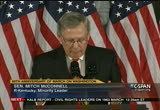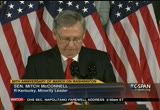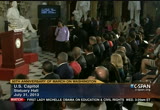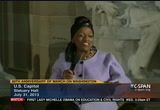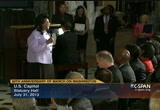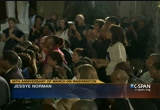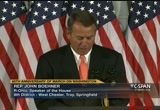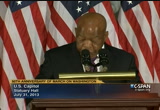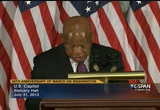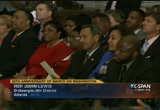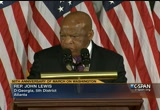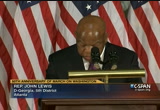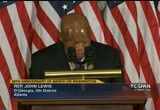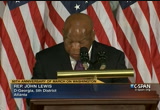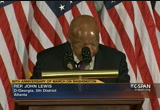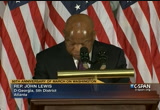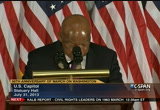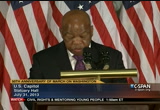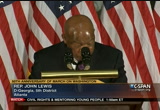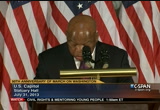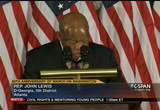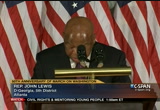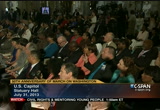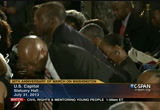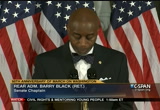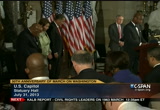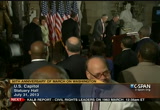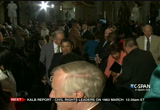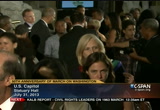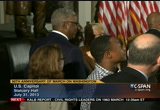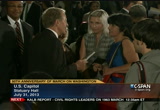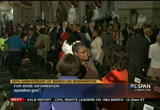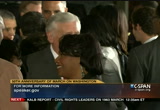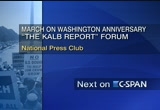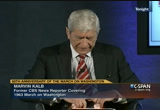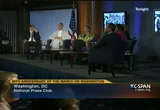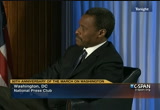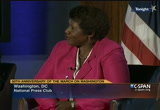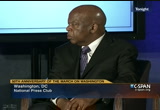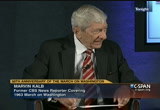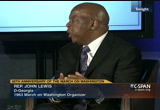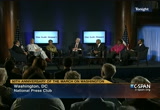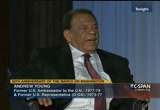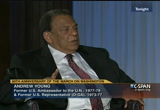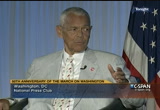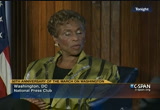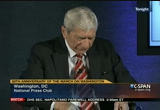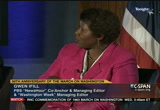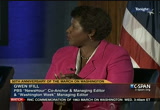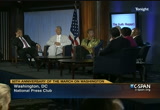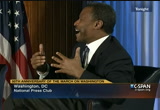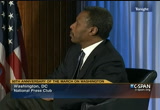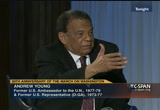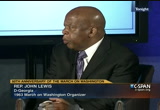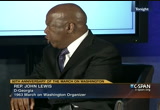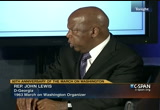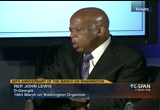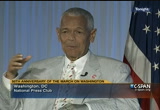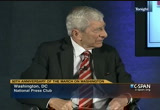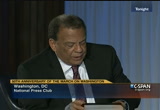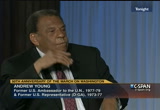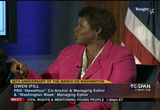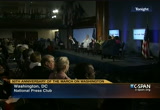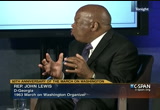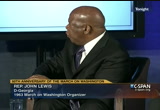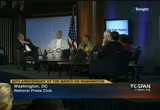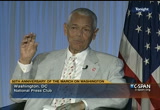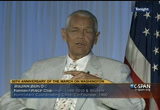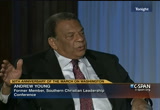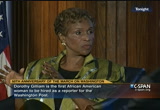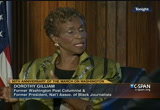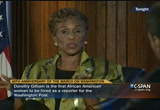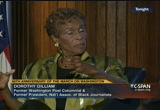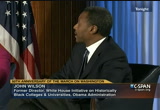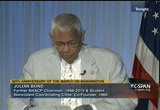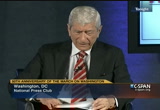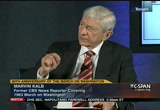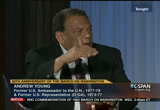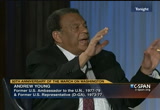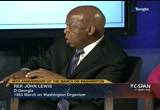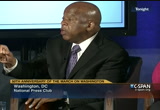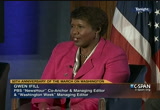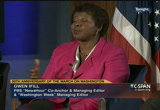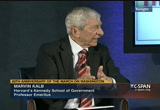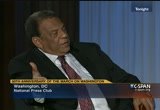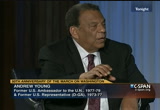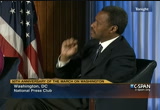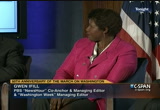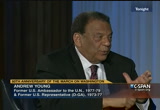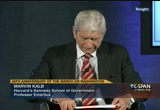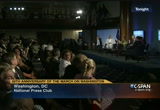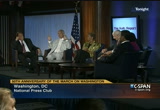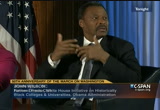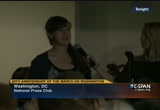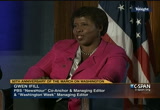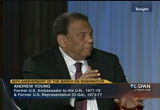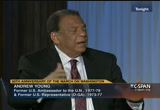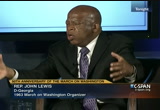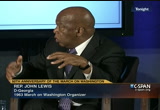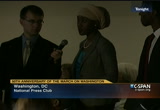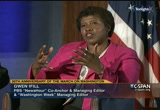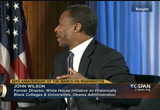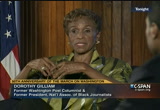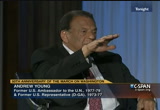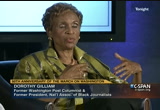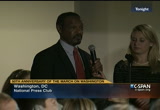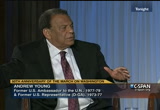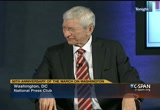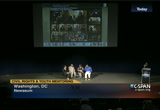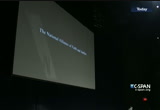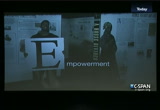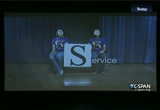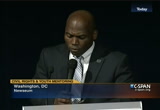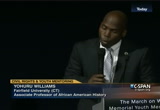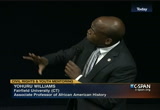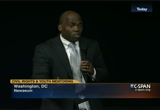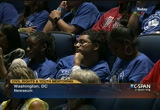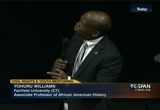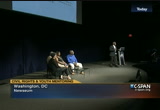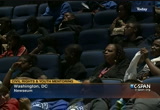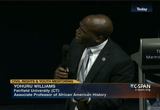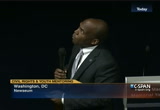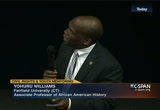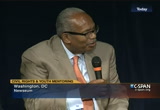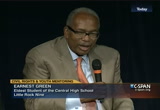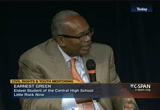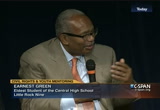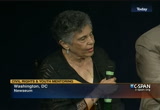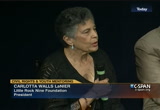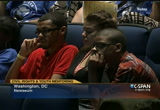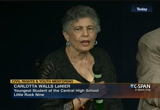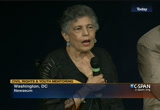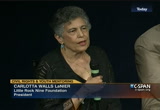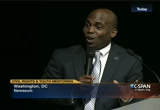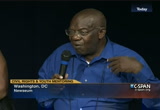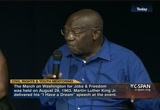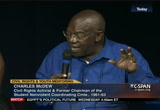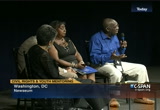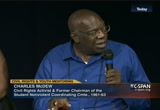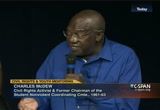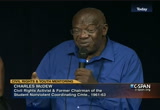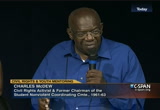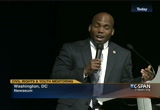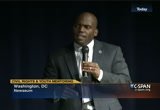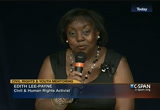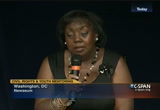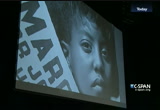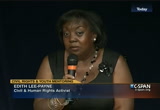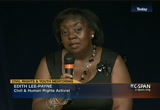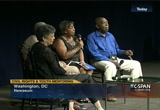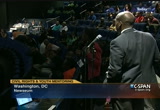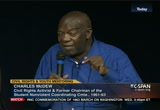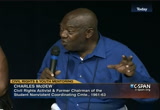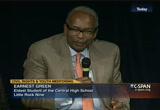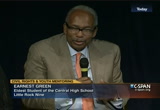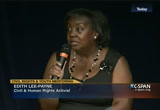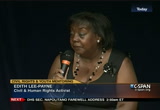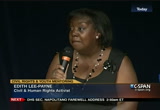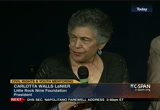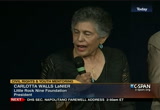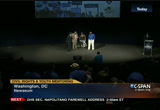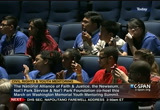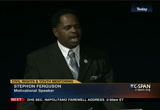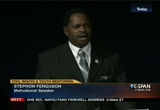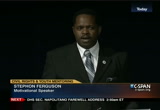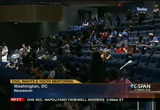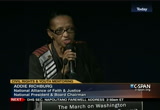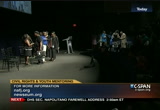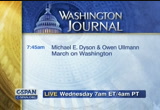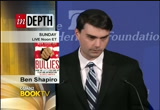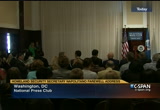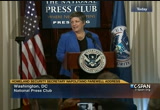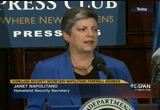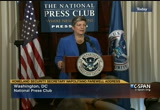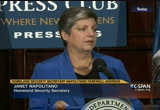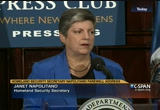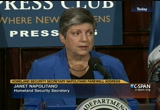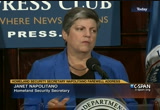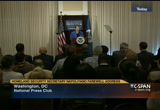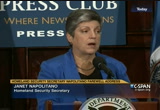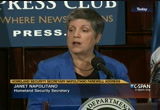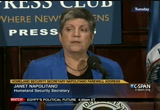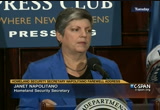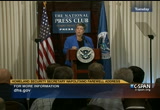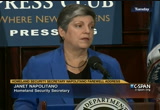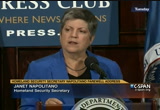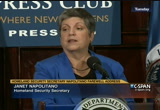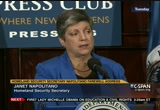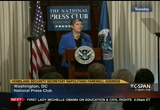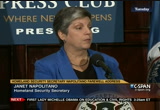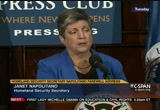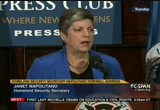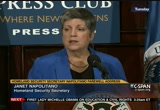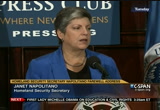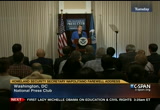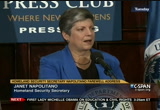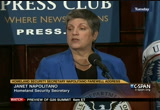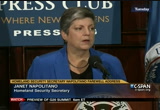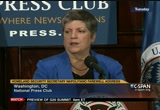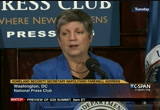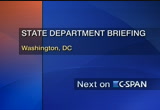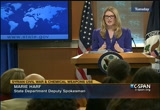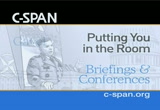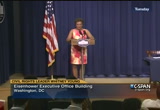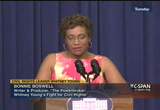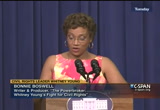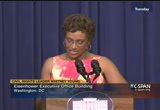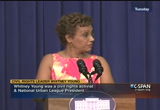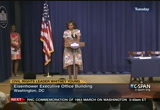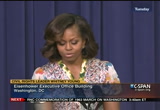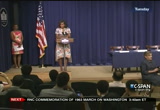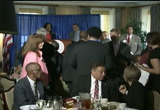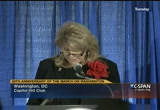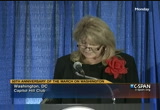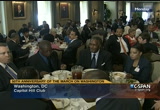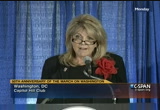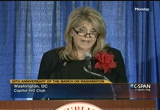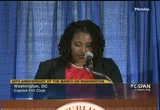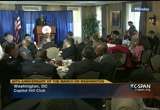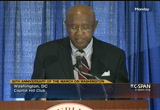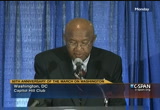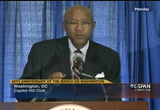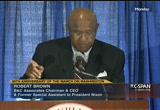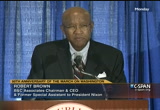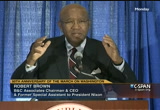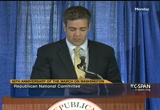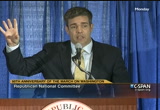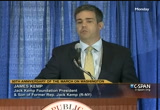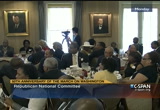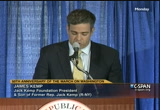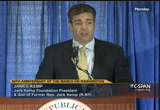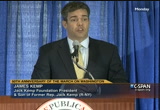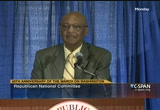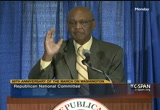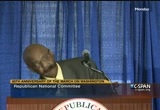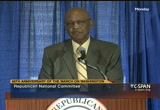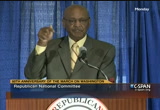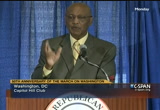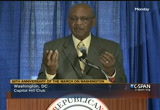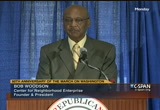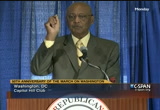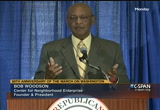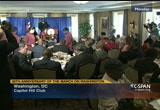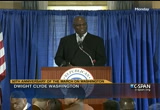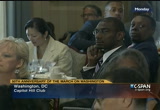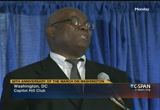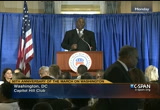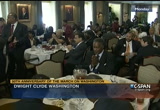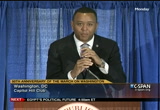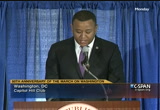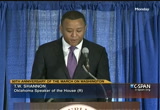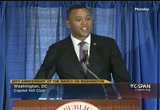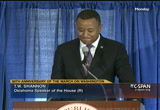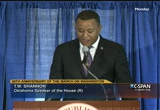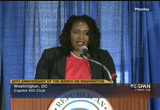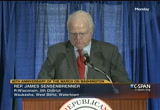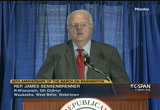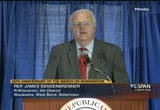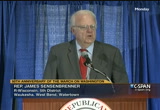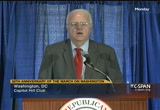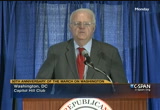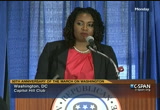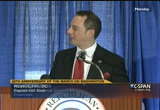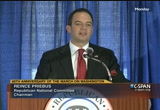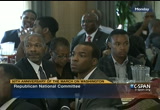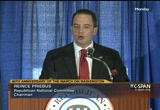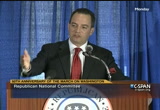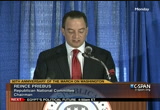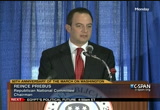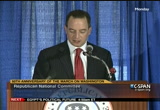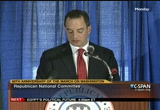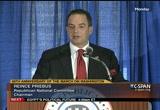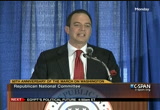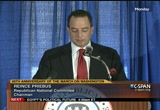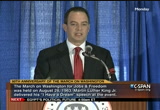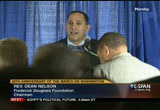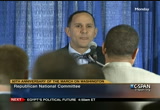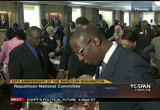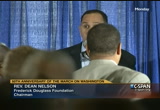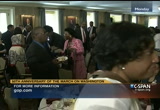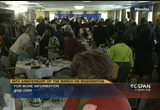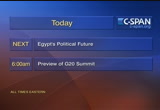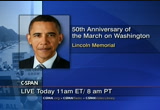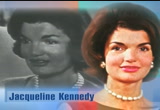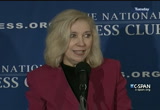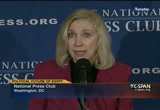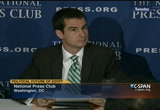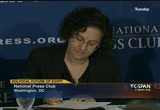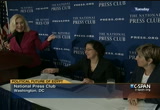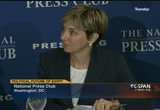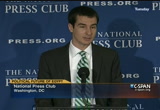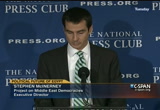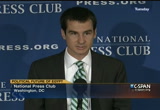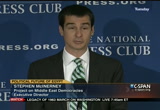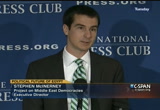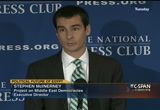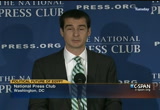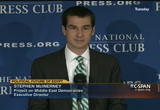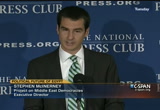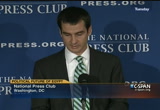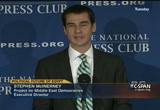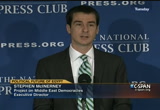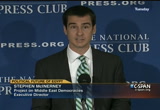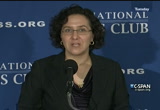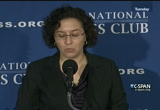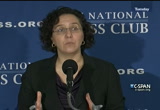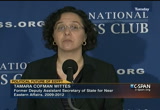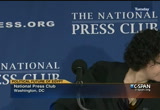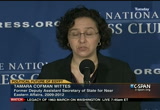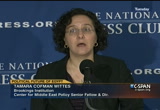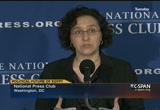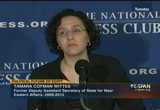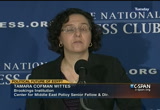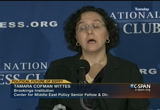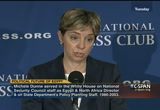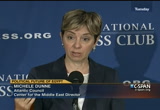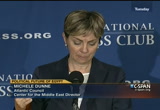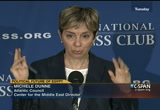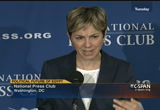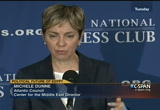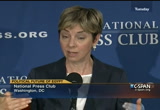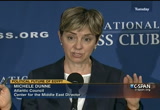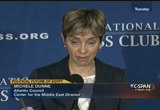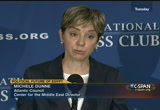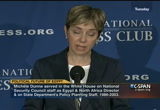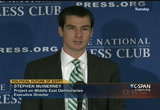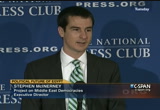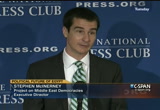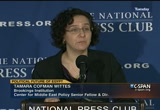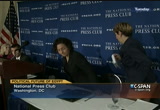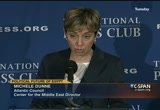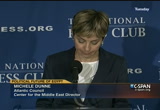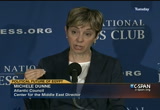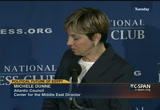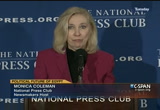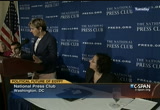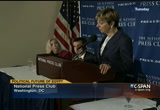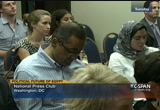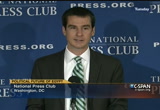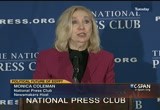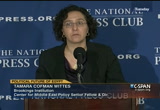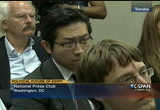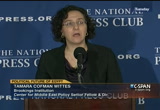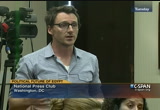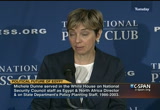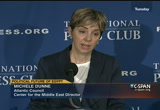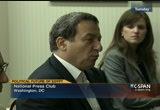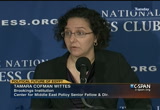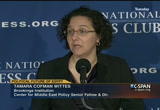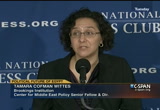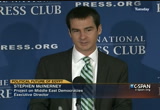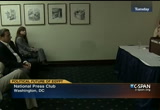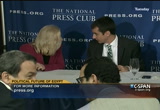tv Capitol Hill Hearings CSPAN August 28, 2013 12:00am-6:01am EDT
12:00 am
remember the march and the movement it represented was the work of many. james madison once said our constitution was the work of many heads and hands. the same can be said of the civil rights movement. i have already mentioned congressman lewis reminds us of the contributions. they lift our hearts. chaplain black and the revel in reverend -- they lift our spirits. all of the seats filled in this
12:01 am
hall of national memory remind us of the many thousands who made their way from every corner of this nation. through great effort, to be here on august 28, 1963. for an event they would never forget. for an event that we as a nation must never forget. thank you. [applause] >> ladies and gentlemen, jesse norman performing a version of >> ladies and gentlemen, jesse norman performing a version of the song performed at the 1963 march on washington for jobs on freedom. "he has got the whole world in his hands. >> let us listen please to the words of this song and
12:02 am
understand that in the heart of our creator, every soul has the same value and should be valued equally. thank you very much for the opportunity to sing for you. ♪ he's got the whole world in his hands. he's got the whole wide world in his hands. he's got the whole world in his hands. he's got the whole world in his hands. [singing "he's got the whole ♪orld in his hands"]
12:05 am
>> ladies and gentlemen, the speaker of the united states house of representatives, the honorable john boehner. >> how about a round of applause? [applause] let me thank my colleagues for their testimonials and express my gratitude to all the members of staff of the congressional black caucus in their assistance planning this ceremony. we have many guests. the mayor is here. our attorney general is here. we want to welcome all of you.
12:06 am
right now, i have the distinct honor of introducing a great patriot, the recipient of the presidential medal of freedom, and original freedom fighter, an architect in the march on washington, and the last living speaker. ladies and gentlemen, the honorable john lewis. [applause] >> thank you. >> thank you, mr. speaker. when i look back on august 28, 1963, the day of the march on washington for jobs and freedom, i see it as one of this nation's
12:07 am
finest hours. the american people push and pull. they struggled, suffered, and some even died, to demonstrate the desire to see a more fair, a more just society. their efforts and commitment ushered in a spirit of bipartisanship, collaboration, and meaningful change into the congress. they became one of the finest hours of american democracy. as members of congress, we owe it to ourselves to take a moment to contemplate the meaning of this 50th anniversary. what will it take for us to come
12:08 am
together to make that kind of progress for the american people once again? in 1963, i was only 23 years old. i had all my hair. [laughter] a few pounds lighter. but in 1963, leading up to the march on washington, there had been an unbelievable amount of action on the part of the movement, on the part of those of us who called ourselves a circle of trust. a band of her others and sisters. people were sitting at lunch counters, standing in at theaters. they were eaten, arrested, and jailed by the hundreds of thousands. assassinated in june of 1963.
12:09 am
12:10 am
for the city of birmingham used police dogs of women and children, involved in peaceful, nonviolent protest. dr. martin luther king jr., irreverent, and other leaders have been arrested and jailed in birmingham. in 1963, millions of american citizens could not register to vote simply because of the color of their skin. lawyers, doctors, college professors, high school principals, maids, butler's, and farmers stood in aim -- in a line all across the south, registered to vote. intimidation surrounded the democratic process. people are afraid of losing their jobs. beaten and even killed, but
12:11 am
trying to register to cast a vote. a society committed to liberty and justice. that the differences between us have some bearing on human life. they made eight decision and they had -- we had to do what we could, give up lives if necessary, to demonstrate those kind of ideas must not prevail. the morning of the march, we met with democrats and republican leaders right here on capitol hill on the house and senate side. some of you here, take the time to come to my office, and you will see a photo, black and
12:12 am
white, at the end of our meeting. a republican who played a major role in having to pass the civil rights of 1964, and only members who voted for the act is the dean of the congress and my dear friend. [applause] the plan that we would walk down the avenue and lead people to the steps of the lincoln memorial. when we step out to the streets, we saw hundreds of thousands of people pouring out the union station. they were black and white, latino, asian, and native american. they were members of -- american
12:13 am
citizens. especially those living in europe, came from abroad to participate, to be a part of the march, to participate in the march. mostly, there were countless and nameless ordinary people with extraordinary vision who came. they wanted to their witness to truth. one people, one family, the human family. we are one people, one house, the american house. we are supposed to be reading them. they are already marching. it was like, there go my people, let me catch up with them. they pushed us down constitution avenue up to the status of the lincoln memorial. about that time, a delegate, a distinguished law student,
12:14 am
already on the mall, russian -- recognize the volunteers for one of the march organizers. two months before the march, members of the so-called big six, the civil rights organization, met with john f kennedy just days before i had been elected the national chair. in a meeting with president kennedy, my first official act. at this meeting, randolph, a spokesperson, told president kennedy we were going to march on washington. president kennedy was concerned. he started twisting and turning
12:15 am
in his chair. he asked us whether he thought there would be violence. mr. randolph said, mr. president, this will be a peaceful, nonviolent protest. he was not so sure. 6000 police officers and troops were deployed around the city. liquor stands were abandoned. a major league baseball game was canceled. someone even rate a sister, so our file system, so they could pull the plug if necessary. the only way to religious service.
12:16 am
they were going to a meeting. saying, how we got over? thousands of us together, it seemed like the whole place, the whole mall, started rocking. somehow in some way, peace, love, and nonviolence had been instilled in the very being of all the participants. we believed in every human being, even those violent toward us, there was the spark of the divine. we had a right to protest. we have a right to demand this nation respect the dignity and worth of every human being. people were moved and inspired by the vision of justice and the quality and were willing to put their lives on the line.
12:17 am
martin luther king jr., this man, inspired all of us with his words. he was a nice speaker. he took those marble steps of the lincoln memorial. he gave us hope. he inspired a nation. i said something like, we march today for jobs and freedom, [indiscernible] hundreds of thousands of our brothers and sisters not here. at the end of my speech, i said,
12:18 am
where is our party? where is the political party that made it necessary to march on washington? i continue to say, we must seek more, we must work for the community for love, peace, and true brotherhood. our minds, souls, and hearts, could not rest until freedom and justice exist for all people. i say to you 50 years later, we've come a distance since that day. many of the issues that gave rise to the march are still present in our society today. violence, long-term unemployment, voting rights, and the need to protect human dignity. we have come a great distance, but we are not finished yet.
12:19 am
it is a struggle of a lifetime. to redeem the soul of america. we still need to find a way to humanize our political institution, our businesses, and our system of education. 50 years later, those of us educated to the full -- calls of justice, need to appease ourselves. our struggle is an ongoing struggle. there will be progress. there will also be setbacks. we must continue to have hope and be still in our faith that this nation will become a truly multiracial democracy. we must continue to work. we must not give up or give in. keep the faith.
12:20 am
and people hurting and suffering, we must be ready to take action, cast our votes, and move our feet. we must have a sense of urgency to use the power rented us to help end human suffering. we as a people and a congress understand our differences do not divide us. we will be at our best when we accept that we are one people, one american family, that we all live in the same house. the american house, the world house. understand that no one, but no one, is breathless.
12:21 am
everyone can make a contribution. the march on washington is saying to us today that we as a nation and a people can come together and lay down the burden of race. we can unite for the common good. we can believe again in the divine spark and us all. great things for all americans, and not just some. after the march was over, president kennedy invited us back down to the white house. he greeted each one of us. he was beaming like a proud father. he was smiling. he was glad everything had gone so well. he shook the hands of the 10 of
12:22 am
us. he said, you did a good job. he said, we all can dream. 50 years later. let's continue the work that has already been done to build a loving community, a community at peace with itself that values the dignity and worth of every citizen and every human being. that is the message of the march on washington. thank you. [applause]
12:23 am
12:24 am
washington. we praise you, through nonviolent, direct action, courageous americans aroused our nation's conscience and helped reduce legislation that brought greater freedom to all. we are grateful, lord, that on that day, america was challenged to remember a dream rooted in the vision of our nation's framers, who believed that america was a land of liberty where freedom should rain from every mountainside. and all of our tomorrows, help us to buy your might follow you
12:25 am
12:26 am
12:32 am
noises] >> the commemoration of the 50th anniversary of the march on washington tomorrow will include speeches by president obama, former president hill clinton and jimmy carter and members of the family of martin luther king, junior. now of for him commemorating the 50th anniversary of the march on washington. analysts include john lewis and andrea young.
12:33 am
this is a little more than an hour. >> this is marvin. >> hello, and welcome to the national press club. of program is remembering march, a movement, and a dream. the civil rights movement that once dominated our headlines and began to touch our national conscience and the i have a dream speech of martin luther king.
12:34 am
many of us feared the march would turn violent, but it was amazingly peaceful. people bound together in a march, probably at that time the largest demonstration at the washington mall ever. i was there to cover the story. aware this wasg more than a news story. moment for the world to enjoy. >> if any of those had gone bad,
12:35 am
we would look bad, but if they go well, it is one of the tributes of democracy. gray,years later, i am and the world is wiser about issues such as economic injustice. we are joined by two journalists and one college president. the only college dedicated to education of african american males. he has held top positions at the
12:36 am
institute of technology and the george washington university. to my far right, again, only in geography, andrew young. he was a close aide to dr. martin luther king. he helped organize the march on washington. he was a former congressman, mayor of atlanta, and ambassador to the united nations. he is currently a professor at the andrew young school of policy studies at your estate university. to my left, gwen ifill, reporter and managing editor of pbs's washington week. she has covered seven presidential campaigns, moderated two vice presidential debates. before that, she worked for nbc,
12:37 am
the new york times, and the washington post. in this business, she is regarded as one of the best. to my right, julian bond, one of the leaders of the civil rights movement while a student at morehouse college. he helped found the student nonviolent coordinating committee. in 1998, he was elected chairman of the naacp, the national association for the advancement of colored people. he was also elected to the georgia house and senate. he has been a radio and television commentator and is currently a professor at both american university and the university of virginia. to my immediate left, a man often described as the conscience of the u.s. congress, john lewis, a congressman from georgia since 1986. at age 23, one of the first to speak at the march on washington. in fact, the only surviving speaker. he took a role in organizing sit
12:38 am
in demonstrations, citing jim crow laws, getting arrested and severely beaten time and time again, trying always to this day to build what he calls "a beloved community in america." to my immediate right, dorothy gilliam, former president of the national association of black journalists. after a number of reporting jobs with black newspapers and magazines, she joined the washington post in 1961, the first black female journalist at the paper. she has been a fellow at the freedom forum in columbia, at the institute of politics at harvard, and that the george washington university school of media and public affairs. let me start with the memories of those among the leaders in the march on washington. congressman lewis, after so much violence against you personally, and against many others in the black community, how did you come to feel that nonviolence was the way to go?
12:39 am
>> as a student in nashville during the late 50's and early 60's, we were taught the way of peace, the way of love, the way of nonviolence. every tuesday night at 6:30 p.m., a small group of students would come together and we would study the teachings of gandhi. -- compassed in india. we would study the role of civil disobedience. we studied the great religions of the world. it had a wonderful teacher but a name of jim lawson. he infused us with the way of nonviolence. many of us, during the early days, except that nonviolence as a way of life, as a way of living, not simply as a
12:40 am
technique or tactic. it became the way of the national movement. >> thank you, sir. ambassador young, i think all of us who were at the march realized that we were experiencing something very special. i wonder what it was about the march that left you moved. >> in the first place, coming out of birmingham, we didn't think much of the march. we thought the movement was in the streets and we had 5000 students take over the city. we collapsed the economy. we got an agreement from 100 businessmen to change the segregation laws of birmingham. we figured the fight was over for us. this was a sunday school picnic. the students in birmingham who got out of jail wanted to do i march on washington like gandhi's march to the sea. they wanted to get out on highway 11 and ticket town by
12:41 am
town. it was a. philip randolph that appeal to dr. king and sent bayard rustin down to try to talk little sense into us. we were what you used to call freedom high. bayard makes sense, but there was nobody in birmingham that was particularly enthusiastic about the march on washington. james, who was probably the main ideologist assigned the march, wouldn't even come. i was not coming until dr. king called and said, you and dean better get on a plane. it was a kind of militant arrogance. that infected us. >> and the march itself? >> the march itself, i was worried that it wouldn't do anything. there was not a lot of harmony.
12:42 am
the naacp and the urban league didn't want the march. for different reasons. it didn't look like it was going to be fun until the people started. when the people -- i was out there on the lawn at 7:00 in the morning when the buses started coming in. when they started coming in and singing freedom songs, from just about every direction, you couldn't hold back the tears. you realized that this was something special, and what i think it did was, it took a southern black movement and with the kind of imaging and television, it made it a global phenomena. >> julian bond, you were talking about sncc a moment ago.
12:43 am
so impatient for justice, and yet your leaders seemed to be preaching patience, appealing to white america to catch up, to get the message. i was wondering if you yourself felt at some point that it wasn't going to happen? >> no, i have always been an optimistic person. i always believe the best can happen. usually, so far anyway, it has happened. i have always believed the best can happen. andy is right. people in our organizations were suspicious of the march on washington. we thought it was a diversion from what we have been doing. we were organizers. we went to the rural south and
12:44 am
help people who had the courage to register to vote. we thought the march on washington would take us away from this kind of activity. i had a feeling that andy did. i got to the mall early in the morning and didn't see anybody. people came and the numbers grew and grew and became something greater than anything i had anticipated it would be. >> dorothy gilliam, and an oral history that you gave, you painted a very stark picture of segregated america. you spoke of old nasty gated racist whites, there look of hatred toward you and other blacks, the culture you said was to kill a black person if they made a misstep. did you feel that the march would accomplish very much? >> i felt the march was a important show of the determination of black america for something better, a new way, a change that had to come.
12:45 am
i think one of the reasons that people were so -- such a, i thought a quiet focused crowd, there wasn't a lot of noise and chatter. people were -- on the speeches, on the purpose. so i really felt that this march, especially in the chain of events of 1963, even as it happened, was crucial and going to lead to something important. >> you were a little girl living up north in relative security. >> buffalo, new york. >> what were your memories of the march on washington and what to do pickup at the dinner table?
12:46 am
>> my father was a minister and probably like your father and all like ministers, they claimed to march with king. [laughter] so he got on the bus and came down with the preachers and they marched in the march. but we are the kind of family that sat in front of the television all the time and were made to watch history. that is probably why i am a journalist today. we were not allowed to go play if there was news happening. in this case, we saw us. we saw our expressions. we were probably too young to fully understand what that meant, but we knew it was important and that somewhere out there dad was there. there had to be something to that. to me, the interesting thing about the marches was that it was 20 years in the making, and
12:47 am
50 years later, we are still assessing whether the demands that were made were met. there were demands. it wasn't just a picnic. it was a set of goals. it was a set of things that were measurable. i talked today about the march, about the civil rights movement. a we talked about how america has moved in fifty-year blanks when it comes to talking about race and segregation. from james madison to abraham lincoln and the gettysburg address, to woodrow wilson who rolled back progress by segregating the federal workforce, and then the march. when you start looking at the way we have evolved over time, it is not just a march. it is that in 1963 and 1964, in part because the march changed the way people look at the movement, lyndon johnson was able to pass a civil rights bill within a year and a voting rights bill the following year. this is something -- and john kennedy's heart was changed because as john lewis mentioned to me, he wasn't feeling this at all.
12:48 am
until the big six went into his office and told him, you have to feel this, we are going to do it anyway. when you watch how quickly things evolved and how slowly things change now, it is remarkable to look back and see how much happened in such a short time, changing hearts and minds as well as laws. >> what you are saying is that the march had a profound affect on the legislation that followed within a year or two bank. >> it had a tremendous effect on people who didn't realize the scope of the problem because it didn't affect them. joan baez called it the salt faces in the crowd connecting. >> dorothy had a rather bleak vision of america is of her experiences. i am wondering, what was yours? >> our experience was, we had to be better than everybody else. my parents were immigrants. we were people who chose to be americans. the idea of coming to this
12:49 am
country and making a decision to transplant your family to make your life better was great. but, we were also taught that it didn't come to you just like that. you had to work for it. you couldn't sit back and expect it. you have to excel in order to get the same thing. and, i learned many years later that sometimes it helps to be underestimated. [laughter] >> dr. wilson, at morehouse college these days when your students think about the march on washington, are they thinking just about the king speech or about the message of that day? >> i think they think about both. i need to tell my story too. i am a preacher's kid. [laughter] i was five or six at the time of the march. my grandmother had written the shoulders of her mother to go here marcus garvey and then she showed up at the march on
12:50 am
washington. i heard a lot about it, heard those stories. those stories are still alive and well on the campus of morehouse college. there is an investment in the peace and justice tradition at morehouse and i stand on the shoulders of the giant who had so much to do behind-the-scenes with everything that we are talking about today. >> it is probably an impossible question and forgive me, but do you see another martin luther king among your students? >> i sure hope so. we are certainly trying to shape the morehouse undergraduate experience to produce the martin luther king of chemistry, biology and a number of other fields. >> i thought we had the first
12:51 am
white president of south africa after mandela at morehouse last year. there was a kid who had been there for years from south africa who was white, who totally immersed himself into everything about morehouse and martin luther king, and it was obvious that he was preparing himself to go back to africa. we also have 10 students from zimbabwe. they were sent by zimbabwe businessmen, paid all the way. he sent 10 women to spelman because he said he wants the next generation of leaders in his companies in africa to have an african-american experience. >> congressman lewis, on the day
12:52 am
of the march, you had to edit your speech to sort of tone down some of its more passionate demands in order to satisfy some of your more cautious colleagues. as you look back upon that now, do you think you made a mistake? should you have kept to your original demand? >> the speech, and julian bond can tell you more about this because he was our communication person and he had made advance copies of my speech available. but, it was a strong speech. president kennedy had proposed a civil rights bill. in my original text, i said the bill proposed by the president was too little and too late. then, much further in the bill, i was reading a copy of the newspaper. i saw a group of black women in
12:53 am
southern africa carrying signs saying one man, one vote. during my march on washington speech, i said something like one man, one vote is the african cry. the kennedy administration took the position that if a person had an education -- he should be considered literate and allowed to vote. we took the position that the only qualification for being registered to vote in our country, especially in the south, should be that of age and residency. many people, one man, one vote. so you tell us to wait. you tell us to be patient. we cannot wait. we cannot be patient. we want our freedom and we want it now. we have prepared a speech that represented the feeling and the
12:54 am
attitude of the people that we were working with, but also the young people that made up the student nonviolent coordinating committee. at one point, i said, listen, mr. president, listen members of congress. you are trying to take the revolution out of the streets. i went on and on in this speech and said, we are involved in a serious revolution. they wanted me to drop referenced revolution and mr. rendell said, i use it myself sometimes. [laughter] then i said, the party of kennedy is the party of eastland. i said, the party of jarvis, a liberal senator from new york is the party of cold water. where is our party? i said, i want to know which
12:55 am
side of the federal government on? at the end of the speech, what people really didn't like [laughter] the archbishop of the diocese of washington was supposed to give an invocation and he threatened not to give the invocation if i didn't change it. it said, if we do not see meaningful progress today, the day may come when we will not confine our march on washington. we may be forced to march through the south the way sherman did nonviolently. [laughter] they said that was inflammatory. mr. randolph, wonderful man said, john, can we change this? dr. king intimate and said, john, that doesn't sound like you.
12:56 am
i couldn't say no to a. philip randolph and dr. martin luther king jr.. these two individuals, i love them. we changed that and near the end of the speech, i avoided making any reference to sherman are marching on the south. i said, if we do not see meaningful progress, we will march through virginia, through mississippi and several other places. do your a member? >> i remember all that. i was donated to the march on washington committee and my task was distributing john's speech, the original speech to murmurs of the press who were seated down below lincoln, still above on the steps. i passed out these copies of john's speech and pointed out to them, that john would be the only speaker speaking that day
12:57 am
who talk about black people instead of negroes or colored people as was the fashion. i thought and we thought that this demonstrated how militant we were and how different we were and better and superior we were from the other civil rights organizations. none of the reporters made any objection. [laughter] >> what did you mean by militant? >> i meant aggressive. nothing harmful or violent. i have always been upset by people who say, they are so militant. they equate it with violence. it is not necessarily equitable with violence. it just means somebody is it aggressively in pursuit of his ideas. we thought we were more militant than all the other groups gathered there. >> what was the magic of dr. king? >> martin luther king jr., more than any other leader of our time, have the capacity and the ability to get people to share the vision.
12:58 am
the day he spoke, he delivered a speech and he started preaching. he delivered a sermon also. he got done and said, i have a dream today, a dream deeply rooted in the american dream. he knew he was preaching. he turned those marble steps of the lincoln memorial into a modern-day pulpit. the real speech, and i downloaded it here to show off. [laughter] in a sense, we have come to our nation's capital to cash a check. when the architects of our republic wrote the magnificent words of the constitution and declaration of independence, they were signing a promissory
12:59 am
note to which every american -- this note was a promise that all men, black men as well as white men, would be guaranteed the inalienable rights of life, liberty and the pursuit of happiness. it is obvious today that america has defaulted on this promissory note insofar as the citizens of color are concerned. instead of honoring this a great obligation, america has given the negro a bad check. that was totally ignored by the that was press, but the message. that is still the message. >> i just want to take a minute
1:00 am
to remind our radio and television audiences that this is remembering the march, the movement, and the dream of congressman john lewis, julian bond, andrew young, gwen ifill, and dorothy gilliam. >> to pick up on what and a young just said, let me put on my reporter hat for a minute, over the years when most people think about the march on washington they only think about the dream speech and that part of the speech. they don't think about anything else and you are right. he said a lot harsher things than anyone talked about. this is including the absence of women on the stage on purpose. they even missed the dream part of the speech. they were looking so much for
1:01 am
the violence that they did not see it. i'm wondering how they thought, having been there, with any notice that they've missed the story. >> i want to address media coverage on the march on washington and i remember the three major networks were there. they covered it without interruption and they broadcasted it to europe. "the washington post" assign more than 60 reporters to cover that story. it was really big news. a congressman, you said that the civil rights movement without the media would be like a bird without wings. what did you mean? >> i meant that.
1:02 am
>> i know you did, but tell us what you meant. without the media, especially in the american south, without reporters, without the photographer, without the cameras to bring the message into the living rooms. >> how did you get that in your head you go -- how did you get that in your head? >> sometimes we had a protest and a demonstration. we knew that we had to do it at the same time, to make the evening news, to be on the 6:00, 6:30, 7:00, 10:00, 11:00. they were just sitting there orderly reading a book, looking straight ahead. they were well-dressed and then
1:03 am
you had the other element that would come up and pour hot water on us, the other elements, the racist elements. people saw the contrast. in birmingham, using dogs on young children. the american people could not take it. they were saying to the congress, to members, you must do something. that is why president kennedy called that meeting in june 1963 and he spoke up and said, mr. president, the black marchers are restless and we're going to march on washington and president kennedy started moving around in his chair. he did not like the idea. if you bring all these people to washington, won't there be violence, chaos, disorder?
1:04 am
mr. randolph, he responded, there has been orderly, peaceful, nonviolent protests and we spoke to the media and we had a productive meeting with the president. we told him we were going to march on washington and a few days later, july 2, 1963, we met in new york city at the roosevelt hotel and in that meeting, we invited four major white religious and labor leaders to join us to call for the march on washington. without the media, the movement would not have succeeded. we needed the press. we came of age with many of the yet other reporters. i had actually worked with the national council of churches and had a program on cbs in 1957
1:05 am
called "look up and live." they gave me 60 seconds introduction and a 92nd conclusion and the one thing that is hard for a preacher to learn is to express something in 60 seconds. i was not the press secretary, but because i had worked with looked up and live, i was always on this. if you're going to make it on the news, you have to make it short. i even told him that when he went to the march. look. if it's a 10 minute speech you get news coverage. if it's an hour, nobody will touch it.
1:06 am
it is a hard lesson to learn. >> i remember the telephone number of the associated press in d.c. i've forgotten it again. anyway, ask me when this is over and i will tell you. >> martin luther king seemed to have a special appreciation of the pervasive power of the media and am wondering how he got it. >> i really don't know, but his genius was he was able to talk to white and black southerners in the common language of the evangelical christianity and know that both of his audiences would understand what you saying, the references he was making, the things he was talking about, and he had this ability which many people do not have to talk to these different groups of people and make them understand. the beauty on the march on washington and his speech was that he is speaking to this large number of white people who had never seen a black person speak an entire speech before. all of a sudden, here is this
1:07 am
articulate man explaining why we are marching, why we are protesting, because we do not like the things that are going on. he made it so clear and so plain that you could not help but say, he is making a real argument here and i inc. he ought to be listened to. >> he was making much more use of the old testament and the new testament though. old testament prophets, when he really got to preaching, he would talk about isaiah and
1:08 am
jeremiah. the jewish rabbis and the jewish congregations. the whole narrative of freedom was we have been locked in the slavery of egypt and we had wandered around in the wilderness of segregation for 40 years and we were about to enter the promised land. that was not christianity. that was judaism. and the jewish community was bombed in the south just like we were. as they were in south africa so that it was an ecumenical movement in the best sense of the word. in the presence of abram henschel on the front lines and a greek orthodox archbishop, this universal freedom rights struggle and not just a black struggle. >> dorothy, you worked for the black press corps covering a number of the hottest stories in the south. how was that different from working at the washington post? >> one major differences was the difference in resources we had a "the washington post". most of the smaller papers had unlimited resources but what they had, i worked for the tri- state defender in memphis and that allowed me to go over and
1:09 am
be a part of a coverage of the little rock nine. the editor of the paper was beaten while he was trying to cover that story because they mistook him as a parent. he told the rookies to stay on the office but obviously when he was beaten, i went to little rock. we were the staff, you know? that was one of the major differences. the important thing about the black press is that they told the story before the daily press got there. once i arrived at "the washington post," very impressed by the resources but one of the major things that was missing was enough diversity in the daily press to really help to tell the story of communities and those stories well. >> forgive me if this is a mean question.
1:10 am
you are talking about the resources of ""the washington post"." they had had 60 reporters covering the march on washington and yet the following day, august 29, 1963, and "the washington post," no mention of martin luther king nor of this speech. you were there. i know you were not covering there. you were there as a spectator. what is your understanding? what was that all about? >> my understanding and trying to piece it together afterwards, first of all, the focus within the media was on the violence. when i spoke to some of the reporters, the editors were giving battle plans of what to do in case of violence, how to look for bad guys. if any reporters got hurt, how do we get together to get the reporters out?
1:11 am
the whole focus was on violence and there was no violence. >> it was a rather great speech. >> i'm coming to that. [laughter] if there had been a black editor among the people making the decision, and i do not want to knock my old paper because i love the people who run it, but the fact is that there were three black people on the whole staff and none of them decision- makers. i was on maternity leave and the other two men i'm sure were part of the coverage, but when newspapers make decisions and people sit around the table and talk about what the news is, what goes on page one, what goes
1:12 am
on the inside, i think it had there been more diversity around the table where someone could have spoken the importance of that speech -- >> that remains true today, too. it's a problem. you talk about how terrible it was in 1963 but newsrooms are not that much more diverse now especially when it comes to decision-makers. people have the sensitivity to see the story no matter what it is as it unfolds around them. >> the bottom line is there was a decision made there as there are decisions made now about what is fit to print. someone made a decision in 63 about whether that was fit to print. if it was not worthy of the attention and they recently apologized for that. >> part of the reason decisions are made is because you need more people around the table.
1:13 am
the reason that is relevant, to pick up on your earlier point about the 50 years and about some of the things dr. king was really demanding, such as an end to poverty, etc. at this moment, as our country gets browner, the media gets wider. we are losing the diversity within the media right now. right now, there are only about 12% people of color in the press today. that includes asian americans, latinos, native americans, african americans. >> let me read something about the preparations made for the march and you will see these racist notions of what black people will do if they gather together --
1:14 am
>> this is not terribly long? >> trust me. all elective surgery in the area was canceled freeing 350 beds for wide room -- related emergencies. they worked 18 hour overtime shifts instead of the normal eight hours. in the event of a riot, they would be stationed on every street corner in downtown washington's business the street to guard against looters and they deployed 86 motorcycles, 20 jeeps, police helicopters, cranes to move broken down or disabled buses and they were placed on around-the-clock standby. 350 inmates were evacuated to provide space for disruptive protesters and national guardsmen were sworn in and given temporary arrest powers. they made over 100 doctors and nurses available. and there is more. >> baseball games were canceled. >> two baseball games. this notion of black people as troublemakers. you cannot have them gather together and they are bringing thousands at a time. what a terrible thing that would be.
1:15 am
>> andrew young, i want to ask you this question. in 2000 or on the 40th anniversary of the civil rights act in lexington, kentucky, the newspaper there, the front page had the following. it has come to the editors attention that the herald leader did to cover the civil rights movement. we regret the omission. using that as a taking point, what was your judgment? you had touched on it earlier, the white coverage of the civil rights movement. i remember that there was a very
1:16 am
distinct difference between local television coverage and network coverage, that if you were in the south and you are watching the local news first and then the network news, you would see two different types of coverage. the local news was extremely sympathetic to the white end of the argument and the networks began to pick up the message of the civil rights movement but it was two things. i'm wondering from your experience, did you come upon this? >> all the time. one of the reasons why we did not mind the act that we were bugged was that we wanted people to know actually what we were doing and saying. a lot of the press and clearly the new york times and the washington post, a lot of them were getting their tips from the fbi and the gbi. once we got past 63 and 64 in saint augustine when the mob turned on the press and in
1:17 am
mississippi when people like all good got fired by abc because he would not cover -- abc was still running the story, forgive me, that these three civil rights workers were hiding to get attention and he knew that they had been killed. he lost his job over that. i had to pull nelson at and out of a mob in saint augustine to keep them from being enough. a danish reporter got hit in the camera eye by a baseball at and knocked his eye socket out. it was ruthless and brutal for the press. that was the national press. the written press never quite believed what they saw. we used to have press conferences at 9:00 in the
1:18 am
morning to say what we were going to do and then the demonstrations would start around 10:30 and that 1:00, we would tell them what we did, why we did it, and we would answer questions but they would still they could not believe that martin luther king was as honest, as decent, as much of a selfless man that he actually was. >> in 1961, may 20, when we arrived in montgomery during the freedom ride at the greyhound bus station, the police department withdrew and they were someplace else. they just did not show up.
1:19 am
an angry mob met the bus and the first people to get near the bus were members of the press and he is reporters were just beaten, just bloody. cameras destroyed. i can remember the names of some of the individuals and i got to know them very well. after they beat the members of the press they turned on us. you come to selma 1965. i recall the name of a major newspaper or even apologized and they all feel sorry that they did not cover the march from selma to montgomery. this major newspaper is located right in the heart of the south. the publisher and the editors said it was the worst mistake they ever made. as an editor and the publisher. they did not cover that but it took "the new york times," newsweek, cbs. cbs, you had a wonderful photographer, lawrence peers.
1:20 am
>> fearless. >> he carried a gun. >> he was shooting a great deal for walter cronkite. quick shooting a film. [laughter] >> laurent said on one occasion, if one of them even touch my camera, -- >> he was a southerner. >> he was from montgomery and he had been with martin from the beginning. gwen, give us your judgment on how well did the american media do the coverage of the civil
1:21 am
rights movement. >> there is a great book called the race meet in which they tell a lot of these stories and they admit some of the things they missed. these were the big newspapers and there's another book written a few years ago by jack nelson who worked for the los angeles times for many years. he very honest but talks about how he didn't see it erie it he did not see the story and how he turned and began to realize that ernest as a reporter that it's a great story and then as a person. there were a lot of mistakes made but i think a lot of it was
1:22 am
not willful blindness as much as it was a lack of exposure among southerners and northerners. among the northerners it was like, really, is this happening? is this important? the genius of the civil rights movement is knowing then and now how to get our attention and by staging sit and's, arrests, doing what would get them on the evening news and then they could not look away. that is when these events begin to happen, when he saw with your own eyes the hoses turning on the children. >> these images were also shown around the world them that was also a major influence on this government. when the little rock nine were integrating and my old editor from the tri-state defender alex wilson was beaten, is picture was on the front page of a newspaper in russia. >> i'm told that president johnson and dr. king would discuss this matter of getting on the news and how, if a demonstration, not through any fault of the demonstrators turned violent, how you would take the incident and make sure that it got on the news. is that your understanding of what the two were talking about?
1:23 am
>> they may be in a much better position to answer that but it's my understanding that after he received the nobel peace prize he came back to america, had a meeting with president johnson and said, we need a voting rights act and president johnson said, dr. king, we don't have the votes in the congress. i just signed the civil rights act. he said, you make me do it. and dr. king joined us in selma and coming out of the white house, we did not get in until 7:00 at night. he waited until the press had gone home. we came out of there around 930 in the president's final words were that the president does not have as much power as you think he does. he could not introduce voting
1:24 am
rights legislation. when we went down that road for the west wing i said, well what do you think? he said, i think we've got to figure out a way to get this president some power. [laughter] seriously. >> was that going to be done through the media? >> it was a moral mandate that he did not have the slightest idea. about three or four days later, a lady by the name of amelia boynton came from selma and talk to them about the fact that they could not have an naacp emancipation day service because jim clark would not let them have mass meetings, political meetings and churches. >> he was the sheriff. he was very mean, a vicious man. he would not let her bury her
1:25 am
husband in a church because he had been to political. so dr. king said, this is where we are going. >> we are rapidly running out of time and i do have a concluding question and i would be most grateful for a quick answer from each of you. i will start with dr. wilson. what is the most important thing that young people, and there are many young people in this audience, what is it that they ought to know and remember, hold dear to their hearts, about the march on washington? >> the real purpose of it was jobs, but what was behind that i think, and what was a revelation for me was how much there was a sub stratus and everything that dr. king did, really all about education. he was really locked in on that and in fact, when the small
1:26 am
group went into the white house to talk to the president, president kennedy said, and this was reported that with the kind of influence you have in the black community, you really ought to emphasize schools and getting your kids to do well in school. >> i am mostly struck by how different things are now. the technology is such that you can get it -- mob to show up and dance in the middle of pennsylvania avenue if you wanted but to get 253,000 people against the mall, there would be old horns, pulpits, it was remarkable and to me, i would like for young people to understand the enormity of what
1:27 am
it took to do that. >> and a very short time, a group of people came together because they believed in something and they put together the most unbelievable moment in american history. >> for the legacy on the march in washington to go or word, to the young people who want to be journalists, to really see that they have an obligation to cover poverty, cover race, go deeper to find the real story. >> julian. >> we are missing the pbs video documentary on the march tonight because we have to be here. >> but it will be online. [laughter] >> see who came to the march, ordinary men and women dressed like they're going to church because many believe they were going to church. >> andrew. >> the world came together around an idea that all men and we soon added women and children, gay, lesbian, all created equal and that it
1:28 am
created a human rights movement. >> i'm terribly sorry to say but time is up and i want to say thanks to everyone in this packed auditorium. i want to say thanks to all of you on the internet, radio and television. thank you to our splendid panelists and i want to say thank you to martin luther king who wrote from a jail in birmingham, alabama, 50 years ago words that applied then and apply with equal power today. injustice anywhere is a threat to justice everywhere. we are caught in an inescapable network of mutuality tied in a single garment of destiny. whatever affects one directly affects all indirectly. and of course, he was right. when i covered the march 5 years ago, i felt like i was involved in something much larger, much more important than a new story.
1:29 am
it was a huge moment in american history. that is it for now. i am marvin kalb. as edward murrow used to say, good night and good luck. [captions copyright national cable satellite corp. 2013] [captioning performed by national captioning institute] >> ladies and gentlemen, this is your opportunity to ask our panelists. we have set aside the team and it's for that purpose and there are microphones on both sides. if you have a question, i would appreciate it if you'd direct it at one of the panelists and make it a question and do it quickly. i will start with, if i can see somebody there -- hello? anybody on either side?
1:30 am
where? >> right here. >> speak up. >> i work here in the city. i'm a former student of mr. bond in charlottesville and a former colleague of gwen's at nbc. how is the movement gain covered and taught in schools today? and again for all of you, is a doctor legacy -- is dr. king's legacy reduced to the speech he made on the 28th or could it act from the birmingham speech? >> would like to answer that? >> the southern poverty law center is looking on how civil rights is being taught and it is not surprisingly found that if you look at the states with the biggest black population, they are most likely to teach about
1:31 am
civil rights. i do not know if this is because of the black people in their states or they realize these people want to know about themselves. and then, they have realized we have made a big mistake. it needs to be taught in all and now north carolina has become the new mississippi now. mississippi lost its place. i will let someone else answered the next question. that is one of my students and a bright young man. >> the story itself, the tradition is alive and well at morehouse college for sure and we are going online with some things, converging via pretties, the brainpower that we need. we have one of our professors and a morehouse grad here at
1:32 am
winston now. a couple of things that happened in this country recently, the monument here in washington, that was about $120 million and the king civil rights museum in atlanta and here is morehouse college who built a chapel in 1979 with a statue out front. we think we need to converge more resources to really undergird this tradition, this king tradition at morehouse and that is what we are going to do. >> i had the honor of working with marvin at the brookings institution previously. my question came up earlier and i think you mentioned it,
1:33 am
regarding the role of women in the civil rights movement and their presence at the march. i'm just wondering if you could speak a little bit about that and the role of women in civil rights and other equality move it's moving or word. >> it's kind of a travesty. it's not as if there were no women moving there were a lot. the women are the foot soldiers, the ones who keep the church open. that used to be the case, but in this case i have asked several people in reporting about where the women were that day because there were no women speakers. the only one scheduled to speak was late because of a transportation snafu and did not there. as a result,, there was no one
1:34 am
speaking. the closest was when jackson said, tell them about the dream, martin. that is the closest. women's places in 1963, as eleanor holmes norton told me, this was pre-feminism. they were not seen to be a part of the public eye. clearly, however, the march sparked other kinds of movements including the feminism movement of the 1960's and 1970's and other movements as well. they took center stage as the days go on. >> josephine baker did speak out in march and mr. randolph asked all the participants to leave town that night. dorothy heitz said she was not leaving and she convened a meeting of women the next day and some of the seeds of the feminist movement were so there. >> you also have to remember that it was a group of women who got behind rosa parks. the montgomery bus boycott was university women from testing the end alabama state university that had gone through several trials of bus boycotts that did not work before rosa parks came in. i mentioned amelia boynton. she went to selma in 1929 as a 19-year-old sent there by george
1:35 am
washington carver. she was there still in 1965 inviting dr. king. she is now 103 years old and she led a get out the vote rally for barack obama and the last election in the back of a car. [applause] she was sitting in the back of a convertible and she registered in 1932, the year i was born. she is still alert, still sharp, and nobody knows her name. i cussed out her sorority sisters because they introduced her and gave her an honor for being a sorority member for 50 years and did not know who she
1:36 am
was. women, it's your fault. [laughter] >> a question here on the left. >> if martin luther king and i had not married little country girls from terry county, alabama, you never would have heard our names. >> all three of their wives came out of the black belt of alabama. women have never, ever receive the credit all across the south, all across america. even here in cambridge, maryland, gloria richardson. in nashville, tennessee, a young woman by the name of diane nash who called a meeting to organize the student nonviolent
1:37 am
organizing community. >> what about daisy bates from the little rock nine? she counseled them. >> and yet they still were not on stage. >> a woman by the name of joann robinson who was a professor at alabama state college long before martin luther king jr. and others did anything. >> was there any discussion about the absence of women on that day? >> the movement was dominated in the early days by ministers, black ministers, lots of them baptist. they were just operating in their own church. >> there is a book about the march on washington just published. it traces the history of women in the labor movement who did much of the work before the march on washington in making it possible. it's a wonderful read. >> william p jones.
1:38 am
>> we got a bad review in the new york times but don't believe that. >> i'm a third-year student at gw law school and it's an honor to be in the presence of such great leaders. my question has to do with the media and the current coverage of the black community. sometimes it seems as though there is a disregard for the problems that affect black people and the leaders who are working to resolve some of those problems but at the same time highlighting more the negative aspect of our community so that the only narrative we have is a negative one. do you feel as if imperative years ago there is a stagnation in terms of how the media covers? or do you think we have progressed so more of our issues are going to be covered.
1:39 am
>> i saw that question barreling right towards me. i would actually like dorothy to way and because as the former president of the national association of black journalists, it is given a lot of thought and putting in a lot of muscle behind this very issue of our representation in the news media. frankly, i think we are better than we were. i still stick by the idea that we have to be represented in the newsroom and we have to see the stories in front of us. if we are all crippled, hampered, whatever experiences we have in life so unless you have a newsroom that as a people with righty of experiences, there's not going to be kind of coverage. i don't necessarily think there is only negativity covered but i do think, as we saw in the
1:40 am
coverage of the march on washington that when there is conflict, that is where the cameras will go. where there is going to be a fight, heat, we're going to pay more attention and for longer time. if it's a trial, we will cover it. that is the post-o.j. experience on cable television but i still think there are so many more platforms that exist other than newspapers, which are fading in order for us to get information. i can click on blogs right now that would tell me in more things about what's going on in the african-american community than i could have ever found out five years ago. because of technology there are lots more places to get the information but it is just not as broad. >> reverend al sharpton has his own show. rachel maddow -- there is one. >> that's not journalism. i think she's talking about journalism, not activism, which
1:41 am
is different, to me. >> there really is a difference between fox and msnbc and you really have the feeling with walter cronkite that there was a solid middle, even in the south. he wrote 11,000 columns and the problem was 700 of them were about race relations. there is nobody doing that in depth column in any journal that i know about right now. >> as to what glenn has said, the responsibility for covering stories of race and poverty really continues. i understand the way media works, of course, and we follow what we think when we think there is a problem. especially in terms of poverty when you have a katrina or some
1:42 am
issue, there is a barrage of stories. there are a lot of disturbing trends that should be covered. >> that's a good representation for me. the majority of the bodies counted in the flood were white. they covered it as a black problem. because the whites were living in the swamps around the city and the blacks got to the dome. but the bodies floating down the river were white. it was really really shallow reporting that we all contributed to and it made it a bad story because there was the story of nobody caring about infrastructure development of the american people in the
1:43 am
mississippi valley and they made it a black story about poverty. >> to build on that, i think the idea is reporters of all stripes really have a responsibility to write about these issues and i think part of the challenge is to use creativity to realize that as the expanding wealth gap, it is a big story affecting people's lives and we keep hearing about it but we do not hear many of the real human stories. especially with young people now, who, i think are more sensitive in many ways than the reporters en masse 50 years ago excluding the great people who covered the civil rights movement.
1:44 am
we need each young person as a journalist to be sensitized to what they do. >> and curious. you can win yourself a pulitzer prize by doing so. >> i remember this advice 50 and 60 years ago and it's the same advice. we are running out of time, that's a fact. one more question on the right. i apologize to the rest of you. >> good evening. my name is ed hayes and i am the proud father of a morehouse man who also works for umc, a show sponsor. one outcome of the march was significant legislation, significant civil rights legislation from a difficult
1:45 am
congress. now as we come together, it is soon after the voting rights act has been neutered and we had a wonderful march last friday and we will have another -- we must have a question. >> what do you think we can get out of this congress after the march? >> we have one good congressman right here. go ahead. >> you must never give up, give in, you must help land optimistic. i think we will get something, maybe not anything comparing to the congress back in 1964 and 1965 but you cannot give up dr. martin luther king. you must do something. >> i went to congress when 27 others opposed the war in vietnam and in the next congress, we stopped the funding. what i think is going to happen in 2014 is women are going to realize that the nonsense in the extremes in both parties are canceling them out and you're going to have a gathering, an
1:46 am
increase of women running in the middle and there will be democrat and republican, but different than the ones you've got in congress now. i think we are going to have a white woman senator from georgia and maybe two more white women congressman. we already have five black congressman from georgia. this repression is making people mad and getting them organized and it will help us in 2014. >> it also requires action. this gives me a chance to plug this. we are interviewing the president and we will be asking him that. [applause] >> i think that's a wonderful way of closing and i want to thank every single panelist. i have been honored to be on this panel with you and i thank you for being with us. all of you, thank you very much and good night. [applause] >> ladies and gentlemen, thank you for joining us tonight as what we remember as the march, the movement, and the train. tomorrow, speeches by
1:47 am
president obama, former presidents bill clinton and jimmy carter and members of the family of dr. martin luther king jr.. live coverage from the lincoln memorial again end of 11:00 a.m. eastern. now, a discussion of civil rights and mentor in young people. speakers include two of the little rock nine am a african- american students denied access to high school in little rock arkansas. the national alliance of eighth seum, inice, the new the national parks foundation cohost this one-hour even. >> again, thank you for your patience as we transition the group back.
1:48 am
in front of you today is a living story of history. an opportunity for us to see what many of us have seen in textbooks and someone whose stories have helped to influence our lives and as someone who we, and a quick psa, rephrase as those who help shape a journey to greatness. we ask that you take a moment now to view this short clip which sets into motion our session this afternoon, a journey to greatness. >> how do you spell greatness?
1:49 am
>> we all know about famous men with goals. >> less well known, is the hundreds of civilians who died. their sacrifice helped desegregate the united states navy. >> rosie the riveter, a symbol of gender equality. >> she changed american society forever. >> frederick douglass once said it is easier to build great children than to repair broken man. >> the trials and triumphs of those who sat at the lunch
1:50 am
counters in birmingham in 1963. those who inspired the formation of the student nonviolent committee. >> those who cap the dream of freedom alive for countless enslaved who traveled on the underground railroad freedom. like my ancestor who traveled north to liberation. >> equality for all. >> that was the concept of men like dr. martin luther king jr. and many others stood for and died for. >> selfishness or service to the community? which journey will you take?
1:51 am
>> s to struggle to choose penitentiary or greatness. >> we have greatness to discover. >> i want to be great. >> i want to be great. >> i want to be great. >> how do you spell greatness? ♪ [applause] >> good afternoon everyone. we are going to get started with our program this afternoon. very briefly, we will reverse the order and put the powerpoint up very quickly. before i introduce the panel, i do want to share with you a few thoughts on greatness. we are fortunate this afternoon to hear from a number of
1:52 am
impressive speakers with you their experiences. i want to frame this panel of impressive people who sit before you. the thing i want to press upon you is that you are the giants, but you must learn from giants to be a giant. if you want to learn a vehicle, you must have someone teach you. you must learn from others. we talk about empowering yourself, or assuming a role in the social justice movement, we want to focus on the fact that we have come a long way. this is a struggle that dates back to the civil war reconstruction. this image from the civil war embodies the problem that has
1:53 am
beset america since 1865. what do you do with the 4.5 million people who were slaves? how do you achieve social justice for people of color? in 1855, frederick douglass was invited to the massachusetts antislavery society to give an address. the question that was posed to him was this, what shall we do with the negro? douglas is going to give a speech and what she's is going to foreshadow the 100 years -- in which he will foreshadow the next 100 years of american history. if you see him on his way to -- this is 1865, 100 years before the brave men and women who stood before you empowered by brown versus board of education working to integrate the schools. understand this. leave him alone.
1:54 am
if you see him at the dinner table, let him go. if you see him going to the ballot locks, let him alone. frederick douglass has outlined three of the major problems -- [applause] they are the cornerstones of what i called the six degrees of segregation. in 1865, frederick douglass was talking about housing, education, jim crowed justice and we are still battling housing, education, access to places of public accommodation. i would say that our struggle has not yet concluded. [applause] if we are to look in the dna,
1:55 am
the blueprint of our music and culture, think about stevie wonder's "living for the city." in many ways, it is a dialogue with frederick douglass, a boy is born in hard times mississippi surrounded by four walls. his parents give him love and affection to keep them strong moving in the right direction, but we can read through and see that they are hobbled by lack of access to education, by poor housing, and ultimately we comes to new york city, trapped i jim crow justice. we would not be able to see those parallels in frederick douglass and in stevie wonder if those struggles were not real. there are also questions of human rights. do i look legal?
1:56 am
we have to understand how those struggles impact our own. we understand that historically, this has been a problem that not only impact the african-american community, but in california was applied to asian-americans. it is an opportunity for us to appreciate what martin luther king says on each of the montgomery bus boycott. when he gives a speech to empower them and keep them excited about staying off the buses in those communities. during that speech says to them, because of the bus situation and montgomery, he says the situation is not at all new. the problem has existed over and this year. the negroes of montgomery and other areas have existed with the analysis of a crippling fear on buses in our community, on so many occasions they make raises the negroes have been humiliated and oppressed because they were
1:57 am
just negro. i do not have time this evening to go into those situations. i will let you in on a little secret, he could have gone into those cases, because he knew them, but he did not have time. these are cartoons from the 1860's. they show african-americans in philadelphia being assaulted in the railway cars. there shows a black woman being assaulted for having access to places of public accommodation. we talk about rosa parks, and i want to celebrate her. i would is only about a woman
1:58 am
named elizabeth jennings who not in 1855, but in 1855 who was arrested for refusing to give up her seat. here's the great thing, i will read a few lines of our deposition for you. i held my hand to the driver, he stopped the car and i got a platform. when the conductor told us to wait for the next car, i told him i could not wait as i was in a hurry to go to -- he then told me the other car had my people in it, and it was designated for that purpose. i told him i had no people. i was in a hurry. young people wake up in the morning and say in the morning i refuse to have my civil rights violated. i believe in human dignity, i believe in equality of men. we do that, greatness simply comes. ask anyone, they will tell you that. people don't know that, they just know that jackie robinson
1:59 am
was segregated on a jim crow bus. where i want to end with you today, is with the words of this woman, the author of a raisin in the sun. i'm to share this with you very quickly. walter, you would not understand, but her dad is going to make a business transaction. this could change all of our lives. when you're about to 17 years old i will pull up the car into the driveway. the gardeners will be coming away the hedges, and i will say hello jefferson, how are you this evening?
2:00 am
we will meet you at the door, and we will kiss each other, and she will take my arm and go up to see you on the floor with the catalogs of all of the great schools in america and the world around you. and i will say, sun, it is your 17th birthday, what did you it is your 17th birthday, what did you decide? whatever you want to be, wherever want to go, you can have it, and i will hinder the world -- hand you the world. they said this could be a play around anybody. i was under the impression that negroes are people. if the ultimately that we desire the same deep things that other people want. the problem is, freedom is not free. as you will hear from our panelists this afternoon, you have to be willing to make a commitment to do that. as i remind you, you need to embrace her greatness. -- your greatness. our deepest fear is not that we are inadequate, our deepest fear
2:01 am
is that we are powerful beyond measure. is that we are powerful beyond measure, it is our light not our darkness not that -- that most frightens us. we ask ourselves, who i to be brilliant, gorgeous, talented? actually, who are you not to be? you are a child of god. you playing small does not change the world. we were all meant to shine as children do. we work or to make manifest the glory of god and it is not just in some of this, it is in everyone. as we let our light shine, we are conscious to give other people permission to do the same. as we are liberated from our own fear, our presence automatically liberates others. today, you're going to hear from four panelists who are going to share their own greatness with
2:02 am
you. hopefully, you can bask in their light, and in the process, embrace your greatness. our first panelist is ernest green from little rock high school. he is recognized for the role he played in desegregation of little rock high. the question we put for mr. green visibly this. as you look back over your journey as the eldest student of the little rock nine and your successful career in business, how would you define leadership? >> that is a question that as a 16-year-old in little rock, i always point out to my colleagues that i never thought 53 years after i graduated from
2:03 am
high school, i was still be trying to get out of high school. but, there is no easy formula for leadership. for the nine of us, we knew that we wanted to pursue the best education that little rock had to offer. we thought, as did most of little rock, and most of arkansas, that it would be relatively -- and i use the word relatively easily among because we had integrated the medical school, we had these are good and the buses and the library quietly.
2:04 am
there had been some other districts outside of little rock in northwest arkansas that had integrated right after the 1954 decision. when the governor decided to use us as his political ping-pong and call up the national guard's to bar our entrance, i told each of us that this is going to be more than us going to school. this is about some bigger issue than just my graduating or getting out of the 10th grade. so greatness -- and i have to relate part of a discussion we had back in the green room --
2:05 am
greatness is something that is threat -- thrust upon you. you do not plan it. if you look around, people who try to pursue greatness, and planet, all on their face. but, you have to, i always say, know when the moment is coming. hopefully, be prepared. and thirdly, have some support. what we had, i think it is important. we had parents, and guardian, and close friends who do not think we were crazy. what i admire about this week, and i have attended the 90s exceed three march, -- the 1963 march, i will be there tomorrow as well. i will hear three presidents, one i work for, president carter, president clinton, and of course, president obama.
2:06 am
and in my lifetime, you know, that is a far reach from a kid in pulaski to say you know three living presidents, because when i was growing up, they were something on mount rushmore, i did not know that they were human. >> great. you guys cannot clap louder for mr. green than that? a question for you -- how were your experiences as a young person at little rock -- what insight can you give to young people today? what sustains you in those moments when you felt you could not go on, and what advice could you offer young people as a result? >> i would have to say that the support that we had from my parents is really what we were taught at home first. and what was reinforced by those black teachers that we had, along with the churches and the communities that we grew up in. they told us that we were -- we could do anything that we wanted to do, that we need to be in control of our lives and that
2:07 am
education was the key to success. and we believed that. and i believe it today. and i think, fortunately, we i think had a good self-esteem because of that type of upbringing that we had. i knew who i was, ok? and i just did not -- unfortunately, those who were terrorizing us, or bullying today, all of it is the same, i knew that i was i was just as good as the next person. to me it was their problem, not mine, that they could not accept me. i knew i had a right to be there. that right was given to me by brown vs. board of education and that supreme court decision. so it was a no-brainer for me to go to little rock central high school when i had the opportunity to sign that sheet of paper.
2:08 am
it was in access to a better education, not that my black teachers were poor teachers, because they were great teachers, but they did not have the facilities to work as well as the white teachers did at little rock central high school. they had twice as many books in the library. the laboratories worked great there. i like to tell the story that i really wanted to be a doctor, and i did not know that -- wanted to be one as well. in my biology class at dunbar junior high school, it was -- 10 of us were standing over a poor little frog trying to dissect it, where over at little rock high school there were two
2:09 am
2:10 am
2:11 am
told that we grew up with is that they cannot take that away from you. they can take other things away from you, but they cannot take what you learn in the schools, in your classrooms. and again, leave the twitter alone, leave facebook alone, go to google and put some names in there and start learning more about -- [applause] the people that have helped to build this country and helped to push this country in the right direction. i am saddened by the incarceration of our african- american men, and i can only think about -- and also about the black-on-black crime in our
2:12 am
urban areas. and i can think about ella baker, who made that statement, until black man and black mothers' sons are really -- all of a sudden i have forgotten the exact quotation, but, you know, white mothers' sons -- they stand up and they get enraged when they are incarcerated. this is something that we need to be enraged about. otherwise, freedom is not there for us. those are the sort of things that really bother me today, that we do not see how important it is to get all the education we can possibly get and move on from there. it will take you to higher levels. the similarities that we have, though, i have noticed, i cannot not mention this, because it has stood out in my mind and was one of the reasons i went to little rock central high school. i was 11 or 12 years old when emmett till was murdered. i will never forget that. and you will never forget trayvon martin. so those are the sorts of things that i -- [applause] >> speaking of trayvon martin, chuck, you were part of a revolution. you interrupted your education to join the student nonviolent
2:13 am
coordinating committee. can you talk about what drove you and your peers to form the organization under the tutelage of ella baker? >> well, one of the -- i have been writing my story, telling my story. and i was here this week, i was here in 1963, and i was struck by the fact that there were so many signs about trayvon martin. we were all moved by what happened with emmett till. and looking back at my notes of other meetings, there was not a person who was not moved by what happened with emmett till. and so i saw signs all along the way in the march about trayvon martin, and i kept saying i wonder if nine people or 10 people will get together to do something about it. they are thinking about it and carrying signs about it. it does very little -- [applause] unless that is made real, unless the body of thought are made flesh. so we came together, as people from different parts of the country, and we were all around the same age when we heard about emmett till. we were all in high school, and it was one of the things that
2:14 am
drove us. it drove us to join the first movement that was directly dealing with the problems. wherever we were. so we came out of one common interest -- georgia, florida, mississippi, alabama, or wherever -- ohio or michigan or wisconsin -- all of us -- that was the common thing that bound us together. so as i walked down saturday at the march, and i saw also many signs about trayvon martin. well, how many of you were carrying signs about that are going to get together with the next guy carrying a sign or the next sister carrying a sign and say, what can we together do to help the cause and move us forward? that is in essence how sncc got created. we came out of a common reaction to injustice and the lack of freedom in our society. we had seen what carlotta and ernie -- there were nine people who stuck together and done something back then. we watched that struggle. and it was like it is just
2:15 am
natural that when mrs. till, emmitt till's mother, had the courage to bring that body back to chicago and had the foresight to put that picture on the cover i mean, i have today the picture of emmett till's body when it appeared on "jet," and i found out that everybody who later became my comrades had the same pictures and were moved by the same sort of thing. all of us -- and we all came from different parts of the country, in different worlds -- but that particular murder had
2:16 am
struck us because this was somebody our age, just as trayvon martin is somebody your age. and we realized to just speak about it or carry signs about it would not do it, would not do anything. there had to be something -- ok, we have a point that is bringing us together, and so we had to figure out what to do with this energy and this anger and this concern -- how we can then put our passions to use. and out of that wanting to do something together -- remember, we all started in the sit-ins. that is one bit of defiance. and then we rose from sit-ins to developing an organization, and the student nonviolent
2:17 am
coordinating committee. i remember coming back from the first founding meeting of the student nonviolent coordinating committee, which was held at shaw university in raleigh, north carolina, easter weekend, 1960. and we decided we are going to do something. we did not have a name. we 15 people were going to do something. later we became the student nonviolent coordinating committee. we came together because the governor of mississippi said this is what is going to happen when they integrate the schools.
2:18 am
emmett till is just the first of that, that people's blood will flow in the streets. but we were prepared to do something about it. it was not just something you saw in "jet," got pissed off about it in "jet" and held up some signs. we would do something that would eventually solve that problem. we formed an organization and formed a plan about doing stuff. i remember we came back -- i came back from -- i was a freshman at south carolina state college and came back to campus, and there was this old guy that used to help us, and he said, son, you mean you all are going to see yourselves changing white folks nonviolently? to rehabilitate white folks
2:19 am
nonviolent? i said, yes, sir, we are. he said, son, how do you all expect to rehabilitate what ain't never been bilitated? i said, yes, that is the real question, that is the real question. how will we rehabilitate what never been bilitated? the bible don't speak to them. the grand promises did not speak to them. how are we going to do deal with these devils? >> a testament to what you accomplished in sncc is that you got governor wallace, segregation today, segregation forever -- how is that working out for him?
2:22 am
edith, you demonstrate that civil rights is the good for the body because you look amazing. beautiful face. this should be a lesson for all of you young people. get involved in civil rights activity and you look beautiful for the rest of your life. amen to that? amen to that? mrs. payne, you became the symbol of use for that iconic picture taken from you at that march on washington. what is the message for young people today? there is the image there. i told you she was beautiful. take a look. two questions -- what compelled
2:23 am
you to march that day, and, secondly, what do young people draw inspiration from today, what should compel them to be involved in the present moment? >> the reason i attended the march 50 years ago tomorrow is because my mother understood -- although we lived in the north, we came from detroit, michigan, which is where i live now, but she knew and i knew from reading different publications like "jet." our black newspaper was then called "the michigan chronicle." i remember vividly seeing the picture of mr. evers after he had been killed. but growing up in the north, in detroit, i lived the dream that dr. king spoke of. i went to integrated schools. i lived in an integrated neighborhood. my friends were both white and black, all through school. it disturbed my mother and it disturbs me that people in the south had problems, they could not live the life that i lived. we dined at lunch counters and took public transportation in contrast to what you heard about rosa parks and others.
2:24 am
we rode on the bus -- it was called the dsr then. and we would ride wherever we wanted to go and sit wherever we wanted to sit. coming to the march for us meant supporting the travesties that were happening in the south. and not just my mother and i, obviously. 250,000 people felt the same way. those that could get there. there were many who watched from their tv's at home that felt the same way and just could not get there. we knew and understood that in
2:25 am
this country, america, there is a democracy, there is supposed to be freedom, that there was not freedom in the south. and we had to unite and stand together. as a child, i was 12 years old, 50 years ago, so you can do the math. i knew that i had a voice, and i knew also that standing there with all of those people there that day, it was making a statement. they carried signs. there were a lot of signs, and you have seen pictures of people carrying signs saying justice now and signs from the uaw for jobs. but it did not end on august 28, 1963. it was not about putting the sign down, getting in the car and going home. the voices continued. the stands continued. when there were sit-ins and demonstrations, there were children who made their presence known even if it meant that they might be beaten, even if it meant that they may be arrested. but because they knew that that
2:26 am
was not the way life was supposed to be for them, they had to do it. and because they did it, people were able to go to school, like these two members of the little rock nine in other places in the south. it is an ongoing process. it does not end. you did not talk about it today and what happened with trayvon martin. we can remind ourselves with hoodies on of his fate. but we do not want it to happen to us because we still wear hoodies. i wear them. my grandchildren wear them. we want that kind of thing to stop. so what we have to do now, every day, is take a stand, use your voice, no matter how young you are. you have it. you have a right to exercise it. you exercise it, more importantly, you do it respectfully. that is the way we did things in the 1960's. that is what nonviolence meant, even if you were mistreated in
2:27 am
the process, as dr. king was, and you have seen evidence of that in history books of either in reading it or seeing it on tv, he came back day after day until the change came. that is what i would encourage you to do. it may not be easy. back in the 1960's, people were people of faith. they knew it was going to get better. and faith is what gets you through day after day after day, and you do not give up. you have determination. you have perseverance. just like you do in school, when you meet challenges in your classes, you do not give up. if you get a c, you try better, you speak up, you do what you have to do. that is why we have been able to advance to where we have 50 years later from 50 years ago.
2:28 am
we still have a long way to go. and as you can tell from the four of us sitting here, we have more years behind us than in front of us, and as we look at you, you have more years in front of you than behind you. and we need you to pick up the mantle and do what needs to be done to make it better for those coming behind you, as well as for yourselves. [applause]
2:29 am
>> two questions. we have time for one or two questions. any students that want to pose a question to the panel? do not miss your opportunity to glean knowledge from these people. any students with questions for the panel? any students with questions for the panel? do not miss your opportunity. we will do this oprah style. bring it right here. there you go. >> thank you. did you ever feel like you were scared, like, were you scared when you decided to protest
2:30 am
integration? what drove you to keep it going, and who is your motivation to keep going? and even though you could get hurt and all that other dangerous stuff -- >> great question. great question. >> we sensed if you ain't scared, you do not know what is going on. because there is something certainly that you should be afraid of and you should be afraid of -- we were in homes that were bombed. a lot of our guys were killed. you had justifiable reasons to be afraid. but you knew that your friends, brothers, and your sisters felt the same way and were going ahead with the same dangers. and so that united -- we faced a common danger. there was no place where it was going to be easy.
2:31 am
and so you swallowed hard and you accepted the challenge before you. it is always going to be there. and our songs would speak of -- nobody turn me around. but you were afraid. but you overcame your fear because you had to, because to not keep going means to stop and not doing anything. and we had decided from the very beginning that we were going to do something about this even it is going to cause some of us our lives. we understood that there was going to be a blood price to be paid, and we would probably have to pay it. >> i would add that you do not start out expecting to die. that is not the motivator that takes you to the effort. but you realize that the history our history is one in which a lot of people paid a deep price for our liberation, and that, as carlotta said, the thing that tormented our enemies most was that we stayed. they wanted us to quit. they wanted you to back down. they wanted you to go back wherever they thought you ought to go back to.
2:32 am
and that the moment you decided that you were going to stick it out, try to do the best you can, whether it is sncc or the little rock nine, there was the same thread that ran through both of your existences -- that was that we were going to show that we belonged there and you are going to have to get used to a new order, a new climate, a change in the world, and that we wanted to be part of it. and i think that that has been the thread that has sustained us from the first slaves that got off the boat in 1619 in jamestown to today. and for you young people, it is what we expect you to do your best, not settle for mediocrity, and not let the crowd determine who and what you are, and be willing to take a stand and stand up for principle. >> let's take another question
2:33 am
right there. >> hi. after 50 years, do you believe that the dream has come alive into reality? >> great question. >> after 50 years, part of the dream has been realized, but we are not there yet. we are not there yet primarily because we made great strides with reverend dr. martin luther king as a leader, and leadership is what is needed, but also there needs to be good followers. and there were good followers that walked alongside dr. king. we have an excellent president. i am not taking away anything from his leadership. but because we just had a
2:34 am
supreme court decision that somewhat reversed the voting rights act that was on the table 50 years ago, for people to have the right to vote means that that is something on the agenda that needs to be taken care of. so that -- [applause] that is something that -- a dream that went backwards, and now we have to bring it back. and so while you have instagram and i know you do not use facebook anymore because i do -- [laughter] you have the ability. think about this. 50 years ago we did not have
2:35 am
social networking. 250,000 people had only telephones and party lines. but they came. imagine if people converged on washington because of trayvon martin, because of the supreme court decision, because a lot of us really do want health care. we want what they call obamacare. we want that. we need that. so if we tweeted, instagrammed, all those other things that you do to people that you know, your families, and said we need to meet on a day, just like randolph and reverend martin luther king and john lewis -- all they said is this is what we need to do, and they did it. if you all did that and your parents did that and your families and friends did that,
2:36 am
there's no reason why there could not be a million people. what do you think congress would do if they saw a million people in washington? that is how you make a difference. that is how you do it. that is how you do it. that is how you make that dream happen. >> one last question. a group? i love that. >> hi. my question to either one of you guys or all of you guys, you know, some kids including myself, we witness a lot of discrimination during school.
2:37 am
my question is, how did you guys cope in dealing with it on a daily basis? >> well, as i said earlier, you really do need to get to know who you are and what you can accomplish. and get centered, ok? because with that you can do almost anything that you put your mind to. just piggyback on some other things that have been said in regard to that, my home was bombed, ok, while i was at little rock central high school, and i got up the very next morning and went to school because i did not want them to think that they had won, all
2:38 am
right? [applause] the other piece is that even through all the adversity that we went through for the year 1957-1958, and my year of not being able to go to school 1958- 1959 because the government closed the school, i went back in 1959 and graduated in 1960. i needed that to validate all the things that i have gone through. i really knew who i was. and i have taken that from there to do whatever i need to do. i do not need a lot of people to validate me in a sense. i need to know within who i am. if you get to know who you are, maybe the world is out there for you. be a part of that global society. [applause] >> we have one more round of applause for carlotta walls lanier. charles mcdew. edith lee-payne. earnest green. please, please. [applause]
2:40 am
if you want to be great, wonderful. but recognize that he who is great among you shall be your servant, and that is the new definition of greatness. this afternoon, the thing that i like about it is that by giving that definition, it means that everybody can be great, because everybody can serve. you do not have to have a college degree to serve. you do not have to make your own subject to serve. you do not have to know about plato and aristotle to serve. you do not know einstein's theory of relativity to serve. you do not know have to know the secretary of thermodynamics in physics to serve. you only need a heart full of grace, and a soul generated by love, and you can be that servant. i just want to talk about a man for a moment. maybe you will discover who i am talking about as i go down the way. he was a great one. he just went about serving. he was born in an obscure village, a child of a poor
2:41 am
peasant woman, and yet he grew up in another obscure village where he worked as a carpenter until he was 30 years old. and then for three years, he just got on his feet and he was an itinerant preacher. he went about doing things. he did not do much. he never wrote a book. he never held an office. he never had a family. he never owned a house. he never went to college. he never went 200 miles from where he was born. he was only 33 when the tide of public opinion turned against him. they called him a rabble-rouser. they called him a troublemaker. they said that he was an agitator. he practiced civil disobedience. he broke injunctions. and so he was turned over to his enemies, and the irony of it all is that it was his friends who turned him over to them. one of his closest friends denied him.
2:42 am
another of his friends turned him over to his enemies. and while he was dying, the people who killed him gambled for his clothing, the only possession that he had in the world. when he was dead, he was buried in a borrowed tomb through the pity of a friend. 20 centuries have come and gone. today he stands as the most influential figure that has ever entered human history. all the armies that ever marched, all the navies that ever sailed, all the parliaments that ever sat, all the kings that ever reigned put together could not affect all the lives of men on the earth as much as that one solitary life. his name may be a familiar one, but today i can hear them talking about it. every now and then somebody says he is lord of lords. then i can hear somebody saying
2:43 am
he is king of kings. somewhere i can hear somebody saying in christ there is no east, no west, and then they go on to say in him there is no north or south, but one great fellowship of love throughout the whole wide world. he did not have anything. he just went about serving and doing good. this afternoon you can be on his right hand or his left hand if you serve. that is the only way in. and this afternoon, as we celebrate these wonderful servants, as we continue and we celebrate the journey to greatness. god bless you. >> i want to thank you again for participating in the last two days. before we go, can we have a hand for addie richburg, please. [applause] >> words cannot express how we
2:44 am
thank all of you for staying, and everybody who were our major wonderful guests. these four people here, to my right and to my left. and we thank the park service, the national park service, represented at the top, her staff, very much as we conclude. i thank the members of the national alliance of faith and justice who helped to work diligently and helped make it possible for all of the logistics to occur. god bless you all, and we look forward to all of you having safe travel and certainly continuing this journey here and beyond. thank you. [applause] [captions copyright national cable satellite corp. 2013] [captioning performed by national captioning institute]
2:47 am
>> the commemoration of the 15th anniversary of the march on washington will feature president obama, jimmy carter, and members of the family of dark mirth or two -- dr. martin luther king jr.. on the next washington journal, we look back at the 1963 march on washington and how america has changed. our guest is the author and radio talkshow host and sociology professor at georgetown university.
2:48 am
live on c-span every day at 7:00 a.m. eastern. >> there are several types of bullying the left loves engaging in. they love it here at racial bullying. the left philosophy is based almost solely and completely at this point on the idea that they stand up for victimized groups. everything they do is to stand up on behalf of some victimized minority. is that if wes oppose their policy, by necessity, the logic is, we hate blacks, jews, and women. that is the philosophy they trot out. >> ben schapiro is sunday's guests. he will take your calls and comments for three hours live starting at noon eastern. looking ahead, congressman john lewis will be october's guest.
2:49 am
2:50 am
>> the secretary of homeland security, janet napolitano's farewell address. for over four years, she has overseen the third-largest cabinet agency in the federal government with more than 240,000 employees across the country and around the world dedicated to keeping our nation safe, secure, and more resilient. these join me in welcoming secretary janet napolitano. [applause] >> hi. thank you. good morning.
2:51 am
thank you for joining us today and that like to thank the national press club for hosting us. i want to thank the men and women of dhs. in my 4.5 years as secretary, i have come to know many of these men and women, hear their stories, and see them perform important work of the department every day. getting to know them has been one of the most rewarding parts of being secretary and any success we have achieved flows directly from their dedication and service. i have also had the chance to engage partners across the homeland security enterprise, governors and mayors, police, firefighters and first responders and business and faith based community leaders. all are essential partners in the shared responsibility for homeland security. i am grateful to have their strong support. the job of securing our nation is a large one. it requires us to enlist the talents and energies of people all across the united states. in that way, all of us are stakeholders in this department's work.
2:52 am
all of us share in its ultimate success. together, we have faced many challenges these past 4.5 years. to list them all would take more time than we have today. among them was an h1ni flu pandemic that affected every state in our nation, the deepwater horizon oil spill which remains one of the worst environmental disasters in our history, and the threat of drug cartel violence along our southwest border. we also confronted numerous terrorist plots and threats, both international and homegrown, and a set of catastrophic natural disasters that included hurricanes, floods, fires, and even an earthquake in washington, dc during my tenure as secretary, we've managed 325 federally declared disasters and issued more than 60 emergency declarations.
2:53 am
in some cases, we provided state of local partners with assistance before the disaster even took lace. -- even took place. each of these challenges tested us in new ways. they presented new opportunities for us to learn, grow, and get better at what we do as a department and as a nation. they allowed us to build on the knowledge gained from spec -- past events and refine our approach as the threats changed and their own understanding increased. looking back over the past 4.5 years, i can say that if there is one take away, one object lesson in core operating principle that i have learned and embraced as secretary, it's this -- in a world of evolving threats, the key to our success is the ability to be flexible and agile and adapt to changing circumstances on the ground whether that is across the globe or here at home. at dhs, to be flexible and agile means bidding forward-looking in
2:54 am
our preparations, early and active in our engagement, nimble and our response, and resilient in our recovery. it means taking every necessary step to prepare for a range of potential outcomes and understanding that if things don't go according to plan or the unexpected occurs, we are ready and able to shift resources and adjust operations, learn from our mistakes, and put ourselves in a position to succeed in the future. being flexible and agile means acknowledging that we may not be able to stop all threats all the time but we can and must be prepared to address them quickly when they happen, minimize the consequences, drop pragmatic lessons and emerge stronger and better. these are the most critical elements of our ability to meet our complex mission. i believe we are seeing that approach bear fruit in a profound positive way. today, i will talk about how we have made the department more flexible, agile, and adaptable
2:55 am
and how that has led to a more integrated and effective response to terrorist threats, more prepared and resilient states, cities, and communities, and a more engaged public. i will give you a few examples to illustrate this point. as many of you know, dhs achieved an important milestone this year -- our 10th anniversary. the nine/11 attack served as the impetus for the creation a decade ago and while it is not our only mission, and hensing our nation's ability to prevent, respond to, and recover from terrorist attacks remains our primary focus. too often, our country is reminded of this ongoing threat. on april 5 teen of this year, our nation suffered a serious
2:56 am
and damaging terrorist attack and the boston marathon. like 9/11, the day began with clear and beautiful weather. like 9/11, by nightfall, we knew that innocent lives would be lost, hundreds more injured, many gravely, and one of our great american cities scarred by the blast of two improvised explosive devices.
2:57 am
no two terrorist events are ever the same. methods and motivations differ but the pain and loss endured by the victims and their families is singular and in comparable. the boston marathon attack was a despicable act of violence directed at a symbolic keys. the event that each year draws athletes and fans from all over the world. the perpetrators of that bombing, we saw the worst of humanity, cowardice, hatred, violence, and intolerance. on that day, and the days that followed, something else also emerged. the very best of humanity. communities banded to get her over silent vigils and a determination to be austin strong. -- boston strong. one thing i have learned to deal with is the importance of working closely and actively with partners at the state and local level. they bear the immediate runt of an attack. they are the first on the scene to respond. they know the needs and capabilities of their communities better than anyone. when i became secretary, we made it a priority that states, cities, and communities have the tools am a training, and resources they need in a crisis. we have spent the last several years working toward that goal. across the country, we have supported stronger information sharing through state and local fusion centers where we have deployed dhs personnel and strengthened our analytic capabilities. we have trained law enforcement
2:58 am
to recognize trends, tactics, behaviors, and other indicators of potential terrorist activities. we have provided federal knowledge regarding terrorism and other threats so it can be incorporated into state and local community-based efforts to prevent violence whether it is the result of violent criminals, extremists, or active shooters. we have improved the ability of local communities to respond to critical incidents including in the city of boston and the commonwealth of massachusetts. for example, we provide homeland security grants to equip and train special response teams in improvised explosive device detection, prevention, response, and recovery. over the years, dhs has supported more than a dozen exercises in boston including a large mass casualty event involving hundreds of responders just last november. we supported the creation of the
2:59 am
medical intelligence center, the only one of its kind in america, to enable information sharing across the austin medical community. -- austin medical community. the emergency -- boston medical community. the reaction after the attack was not accidental. it was a product of years of training and investment in the link state and local capacity and the quick, orderly, focused, and comprehensive response by law enforcement, first responders, and the larger boston community on that day saved lives. immediate control over the scene by law enforcement and assistance from first responders and medical personnel helped triagew, it back you entry the fallen fallen and injured, a scenario they have practiced to ensure no one facility would be overwhelmed. citizens stepped up and played a critical role, it hearing for the wounded, donating blood, and idtify the suspects -- aelped powerful reminder of the role the public lays in providing aid
4:57 am
about what we might expect in the weeks and months ahead. to begin with, in terms of where we are, we are witnessing a and a to authoritarianism rise of the old state that was dominated by egypt's military. the security and intelligence apparatus range for decade under the rule of hosni mubarak. many of us hoped that the uprising and revolution in egypt would lead to a transition to democracy and accountable government that respected and
4:58 am
respects the rights of egypt's citizens. this is been deeply disappointing. i want to describe the current scene and leave a few thoughts about what we might see in the time ahead. a lot of the analysis of egypt has described three main groups of political actors. regime andy, the old the former national democratic .arty and the islamists liberald group is the and secular political forces. this group includes political parties and ngos. theaps most importantly is liberal and secular block of grassroots movements. the april 16 movement. the campaign which played a leading role in street protests
4:59 am
in 2011. they emerge the spring in opposition to mohamed morsi. -- the driving force behind the protests. they forced morsi from power. what we see in the analysis of egypt is that when two of these three groups. the islamists and secularists, the military and the old regime, joined forces and force their will on the third block. we can cite three or four instances of this and we can describe the revolution in 2011 as the liberal and islamist forces joining and forcing mubarak from power. the alignment saw
5:00 am
of the muslim brotherhood and the islamists. they ignore the demands of the liberals. you could describe the presidential election in 2012 as the liberals unifying. supportedthem had mohamed morsi during the second round of presidential elections. him overrals supported the choice from the old regime. seen thently, we have latest configuration of the let -- the military joining the liberals. i think a lot of what we're seeing is the military seizing this opportunity to regain power . they are taking steps to ensure the other two groups can no longer ally themselves against the military. have forced the
5:01 am
hand. been crackingas down viciously against the muslim brotherhood. they had a coup on july 3. they arrested the leaders of the muslim brotherhood movement and brought charges against them. the viciously attacked supporters of mohamed morsi in the brotherhood in the streets and killed. more than 1000 people have been killed. on august600 people 14. over 1000 were wounded. campaigneen a vicious of propaganda in the state media. the brotherhood and the supporters. recently, a, more defamation campaign and a military, by the
5:02 am
beyond the brotherhood and the supporters. they are starting to attack the liberal and secular forces that the military views as a threat. we have seen several examples of this. what we're seeing is the thatary targeting actors the military intelligence apparatus has seen as orublesome, either currently in the past few years. elbaradei was the most liberal politician. massacreed after the on august 14 and was immediately attacked by the military and former regime members. charges have been against him. austria and is staying at in egypt to avoid prosecution. the movement that i mentioned has long been seen as a threat
5:03 am
by the military. they were part of the 2011 revolution and they are part of the leadership in this movement. they have been critical of the military and the violence that we've seen in the last couple of weeks. a few days ago, we had a public prosecutor in egypt announce to high-profile youth activists arrested in this movement. investigationr for charges of espionage and receiving foreign funding for their activism. because it ise the military attacking its and these young women have been supportive of the military action but not of the coup. none of the last, we are seeing nevertheless, we are
5:04 am
seeing preemptive actions. addition, there is a community of ngos and human rights organizations in egypt. in the last three or four days, we have seen the offices of egypt, including human rights organizations, being intimidated and their staffs were intimidated. thatincludes organizations were willing to speak critically of the military in recent weeks. we've seen several newspapers -- i'm sorry, articles -- in the conspiraciesscribe where the united states and in bastrop addison work with the muslim brotherhood to smuggle terrorists and extremists into egypt from gaza and working with
5:05 am
ngos to make this happen. this is representative of the widespread disinformation campaign. it is troubling. the implication of the egyptian feeding on away is heightened sense of the scene of phobia and anti-americanism. this is feared by many to be a precursor to be a widespread crackdown on the ngo community. any ngo that could be critical of them. one final thing i would mention is labor movements, as well. and socialents protest movements were instrumental in the 2011 revolution. these social protest movements at continued in recent weeks. --have seen, crying recently quite recently, a crackdown on these movements and the twirls
5:06 am
of the muslim brotherhood. the muslim brotherhood as very little reach in the labor movements. ofve seen several references labor unions coming under attack and articles in the press and statements by the ministry of labor that attacks these movements as twirls of the rutherford to sow chaos and undermine the state. brotherhood --he tools of the brotherhood to undermine the state. we now see a constitution underway that was ratified in december and passed by referendum. it was written by the islamists constituent set assembly -- assembly. we will release the recommendations of a 10-person
5:07 am
committee to make opposed amendments to the constitution. these amendments are not encouraging, for those who wish to see democracy emerged in egypt. rather than addressing the flaws that you could point you in because duchenne, from the -- that you could point you in because duchenne -- the constitution, there are troubling steps like rewriting nts atnce at -- hi moving back towards the old regime. they are recommending that be removed. there's rewriting of some language in the constitution of thehe heroic martyrs january 25 revolution. january 25 has been omitted and theas been described as
5:08 am
revolution. they're looking at this year as the rogue revolution of egypt. question going forward is how long the military is able to maintain their current popularity. they have been influential, up to now. they used state media and information to become extremely popular in the country, at the moment, with the general public. how long can they hold this one coalition? i would say that they have survived to events that could fracture support from the military. the first is large-scale violence against the protesters. many predicted that if they used serious violence against the protesters and supporters of mohamed morsi, a lot of the
5:09 am
liberals would step away. we saw a couple subtle way. -- step away. that many event pretty good would a road support of the military was the release of hosni mubarak. he was released last week and that has had, as of now, less of an effect than many expected. we will see the weeks and months ahead. ,e may be cleared of charges including killing protesters. that may spark interaction. -- a reaction. from thenment came government possibility to address economic woes. this military will not undertake serious economic reform and they
5:10 am
seem to count on the largess of the united arab emirates to help them hold egypt's economy together. i will leave that for later. >> good morning. thank you for coming. i will take a few minutes to talk about the regional politics and regional dynamics surrounding events in egypt and how the positioning of different regional actors will affect the trajectory. let me start with giving you context. egypttood. and mubarak, played a critical role in stability. they are on top of the suez canal, which carries seven percent of the world's oil. treaty was and is
5:11 am
stored event and and anchor of arab-israeli he's making. -- peacemaking. it has prevented war ever since. because of this edition and role in regional stability, it is no surprise that the government of then middle east feel a major stake in egypt, as the united states does. tiesak had close personal to a number of leaders in the state of the arabian peninsula. especially king of dollar. dullah. in the years prior to the air awakening, there was a coalition on behalf of the balance of power in the middle east.
5:12 am
mubarak was a linchpin of that diplomatic effort and that is fair to say. of the golf never fully reconciled mubarak's fall. they're not comfortable with democracy in their neighborhood. they had good ties with the egyptian military and they have sustained those since january of 2011. the muslim brotherhood troubled these states.deeply . they are seen as a threat to the original order. because of their ideology. the brotherhood is seen as a brotherhood,e the which some of you may know, is an organization that has national branches and a shared ideology across the various groups.
5:13 am
they have produced offshoots that are violent. hamasncludes thomas -- and splinter groups have become significantly troublesome terrorist organizations. that,oblem is ideologically and politically, they challenge golf monarchies in their claims for legitimacy in regional rule. that is one of the reasons they find them so threatening. giving you an example, since 2011, and the united arab emirates, the amount of people who remains muslim brotherhood members. morsi's behavior as president of egypt made these goals arab states even more anxious.
5:14 am
iran was to a ran -- his first as president. he talked of normalizing relationships with a ron -- iran. especially with the support of abbas and the palestinian authority. economic mismanagement under as steve noted, was a real problem. in egypt,ismanagement because it is so large and has been a banking center in the middle east for a long time, a manufacturing hub, a distribution of, for a lot of businesses that sell around the region. in egypt have a lot of implications for the rest of the region. let's -- his first visit was to saudi arabia, not to iran.
5:15 am
sorry. and, his tense relationship with the military. on golf monarchy cheered mubarak. they were rewarded with a great deal of financial assistance. that financial assistance is not all cash that the egyptian government can spend. a lot of it represents temporary deposits in the egyptian central-bank that are in port -- thategypt supporting are important to egypt supporting its currency. this is not money. the is not money that egyptian government can spend on national development. let me spend a few minutes on israel. i want to leave you with two broad points.
5:16 am
many of the attitudes that i described our shared by israelis. characteristic that you can see in the israeli government and their approach towards egypt since 2011 is ambivalence. they have been ambivalence towards change in egypt. at bottom, they had close relationships with the egyptian military and the intelligence services. was someone they knew. there was predictability and reliability in that relationship . it was never warm. the tie between the egyptian security apparatus in the israeli security apparatus has been sustained since the revolution and, they are stronger than they ever been. they were strong under president morsi.
5:17 am
the israeli government sought closer diplomatic and political ties with president morsi. they were robust. they were reassured by morsi's 2012 when he made himself and the government began a tour of the cease-fire that ended the gaza crisis. they look at cairo and say this is a group of people we know and can work with. two broad points to leave you , the sentiments i'm describing among governments around the region suggest a divergence with perspectives in washington and the policy of the united states administration. this is a divergence that goes beyond egypt itself. it is a divergence analysis of
5:18 am
the region and what has happened in the region over the last two years. they have been the source of instability. president obama said, in may underlyingthere are social and economic changes in the air of world that have led for more responsive and transparent government. many officials say that they do not believe that stability will return to the middle east hotel governments are more transparent and responsive and more democratic. i'veof the governments talked about see things differently. they see the demand for democratization coming from below and it is a source of stability -- instability. they are wary of seeking domestic reform. they fear that if you give people an inch they will take a mile.
5:19 am
-- if you give people an inch, they'll take a mile. to leave you with is about sinai. this is the space to watch. when you watch the regional threats that could emerge from the events in egypt, sinai is where you will see it manifest. rally -- egyptian-is ptian- security -- egy israeli relations are tight. of, frankly, the egyptian military during its time of direct rule and since july 3, they have been required to focus so much resources on domestic order and it does not
5:20 am
have the same level of resources devoted to maintaining security in the sinai. they have grown older and are working hard to draw egypt and israeli forces into direct confrontation. they want is really forces to cross the border into sinai. this is a combustible situation. the longer the political crisis in egypt goes on, the longer that egypt finds its domestic situation is stabilized, the more you will -- these in jihad e-groups jihad groups taking advantage and producing instability in the region. thank you so much.
5:21 am
>> good morning. am michellen -- i dunn. i have four points that i would like to make about u.s. policy towards egypt. the first point is the need to locate -- look at this in the proper context. the united states was too passive during the morsi presidency. he was an unsuccessful president and a bad president. he refused to build consensus and took on democratic actions. he passed the last constitution. the 2012 constitution, over the objection of the egyptians. people did very little.
5:22 am
policy,ut years of u.s. what the united states has done is to stay close to whoever is in power in egypt at the time. mubarak, when he was there. the armed forces, when they were there. morsi, when he was there. now, once again, a military government. this leads the united states into a real problem when it comes to exerting influence in egypt. as we know, in early july, at the time of the military to, the united states urged, correctly, in my view, that the egyptian solve was has to solve the political problem of lyrical paralysis and inability to address the serious economic issues in the country. they urged egypt to address this in a democratic manner and
5:23 am
layout the political game towards the elections. early elections and so forth. that was not advised that the egyptian military took. stophad a military to will -- cioup. the united states believes that the zero-some holidays that we sume seen in the -- zero- politics that we have seen in egypt is disastrous. you cannot run the country with the brotherhood alone. as we're seeing, that is a failure. the idea of the brotherhood will be crushed and excluded, these claims that we here in egypt, that the united states is try to weaken egypt, steve made reference to these conspiracies, these are the opposite of what
5:24 am
is true. united states fears at what is happening in egypt with these isitics and this repression what is going to weaken egypt. ok? that is the context. influenceto exert the that they could during earlier eras. now, you know, try to step forward causes a lot of confusion in egypt and leaves the united states open to charges of hypocrisy and so forth. that i thinknt is that if we look at the question of u.s. influence, we have to look at this in the right context. we have to have a right-sized influence in egypt. it is not the case that we can expect threats of cutting off
5:25 am
assistance, whether relatively small or the larger military can really cause the egyptian government to reverse all of theirange calculations with domestic politics. it is not going to happen. that is true because the united states made, what i believe is a not observing u.s. law and extending -- suspending military aid at the time of the coup. that, the united states would be in a stronger position and we will be discussing what the conditions are for resuming eight. -- aid. we are in a situation where the united states and not respect their own law and that diminishes respect for the united states. you know. thatave to understand
5:26 am
cutting off aid here or there is fundamentally. changethe cap lesions in egypt thefundamentally change calculations in egypt. try tod point is, as we understand u.s. influence, a lot of people are going to the opposite conclusion. they think of the united states has no influence and i think that is incorrect. example,ntioned, for assistance and what difference does it make if the united states suspends military assistance to egypt when other countries are coming in with assistance. this is a superficial understanding of the assistance question.
5:27 am
egypt has been a country, over the last decade, that has had a deep and enduring security relationship with united states. this is not about dollars and cents. this is about cooperation and shared technology. sheared military exercises and ctrine.nd -- do towardsde a shift western-bloc in the 70s. it is bigger than the dollars and sense of the a. cents of thed aid. this is also true economically.
5:28 am
that has haduntry a great deal of trade with europe and the united states. a great deal towards him from the last -- tourism from the west. for egypt to shift from the country that has the security and economic relationship with the west to a country that is living on the largess of gulf countries would be a huge shift. if we are looking at influence, western influence, american, european influence in egypt, it has to do with this much larger relationship and not with how many dollars are being appropriated by the u.s. congress and going to egypt. we need to understand. my fourth point is, how do we
5:29 am
think about it now? i think it has become clear that the egyptian government, the military is launched on this course, a very unfortunate course and a course that i think will promise much instability in egypt which will in turn make it impossible to address the economic problems because you cannot bring tourism and investment back to the country in an atmosphere of instability. that will lead to more instability. we have seen several turns of the wheel with egyptian public opinion. against the mubarak regime, in favor of the staff, against the staff, in favor of the brotherhood, in favor of the military, who would that that this is the last turn of the wheel? i wouldn't bet on that.
5:30 am
it has been a very unstable situation in egypt in terms of look sentiment and it will continue to be so. there's going to be more change. how do we think about u.s. policy now? i think that president obama in his remarks to cnn on august 23 has started to take this in the right direction. first of all, there is finally underway a review of u.s. assistance to egypt, an internal review. this is long overdue. programs are being looked at and many of the programs right now are in effect suspended. although there is no announcement of a suspension to aid. i think the united states is as it should be, pausing. a couple of things that president obama said on august
5:31 am
23, he said there is no doubt we can't return to business as usual given what has happened. he is referring to the august 14 massacre and use of force to clear demonstrations in cairo. he said with egypt, the aid itself may not reverse what the interim government does. but what most americans would say is we have to be very careful about being seen as aiding and abetting actions that we think are on the contrary to our values and ideals. this is how we need to think about u.s. policy. it is not simply a question of, can we buy a little bit more, less influence by doing this thing or that thing. we have to really start thinking about a longer-term picture, a broader picture, what is in the best interest of the egyptian people, and also what is in the best interest of the united states? to what extent can the united
5:32 am
states associate itself with the actions of the egyptian government in this situation? i will leave it there. thank you. >> thank you to all our speakers. that was wonderful information. we are going to open up the floor for questions. i would like to give each speaker the opportunity to respond to what the other speakers have said. steve, would you like to start? >> i agree with much of what was said by both tamara and michele. i would just pick up from the last closing points, first we have to expect further changes in egypt. we can't know how or when things will change, but it would be
5:33 am
unrealistic and foolish after the last few years to assume that change is now done and that we can focus on our relationship with the actors that are now in charge. also, i would just add that united states policy in egypt must fundamentally shift. michelle was just quoting from president obama's remarks last week. i would agree with her that his remarks reflect a positive shift if they are implemented. i would also add that we have seen remarks from the president and from other high-ranking u.s. officials in the past that would have suggested a shift in u.s. policy that i think would have been some of the right shifts.
5:34 am
tamara referenced the speech in may of 2011. in that speech, the president declared that support for democratic principles in the middle east would no longer be a secondary priority. they would be supported by all of the political and strategic and economic tools available to the united states. i think that was exactly the right shift that was needed in the spring of 2011. i think sadly we haven't seen that reflected at all in u.s. policy since then. and i would fear that the remarks last week by president obama might the only a sort of repetition of the administration and the president saying the right thing but really being unwilling to back those up by policy changes. if so, i think u.s. policy will continue to fail as it has up till now. >> i will be very brief because i don't have any areas of disagreement with either of my two colleagues. i will just say that i think we
5:35 am
have to remember that as we talk about u.s. policy, policy of other regional actors to word egypt, there is an underlying social reality here that drove the revolutions of 2011. it is about the graphics, economics, technology. these are trends that have been building up over years. they are not going away. there is something that all governments in the region and beyond have to take account of and adapt to. some of that adaptation process may be very disorderly. i think it is important that those looking at the situation not misdiagnose the root of that disorder. it is not the demand for democracy that is creating disorder. it is the need for institutions, especially government institutions to adapt to this new social reality. the quicker that they recognize
5:36 am
that, the quicker that they make those adjustments, in other words open up and give people a voice, i think the sooner the region will stabilize. that fundamental recognition i think is what president obama articulated in may 2011. i think steve is right. the administration has not done a great job of holding fast to that recognition. but i think the same could very much be true, could be said to be true of governments in the region many times over. with that note of broader context, let me turn it over to michele. >> thanks. i wanted to at one point to what steve was saying in his initial remarks about the inside of egypt today.
5:37 am
you were talking about the military being behind a number of things. i wanted to bring up the dimension of the internal security services and intelligence services. they were very much on the defensive for the last couple of years. after the fall of mubarak, the police and the security services, state security, the intelligence services were harshly criticized by the public and they were sort of in retreat. they were sort of cowed, they were taking a low profile. they were coming under harsh criticism for past human rights abuses. intrusions into public freedoms and civic freedoms and so forth. they are now back.
5:38 am
the interior minister came right out and announced it a few weeks ago. we are back. we are back in two political affairs, religious affairs, etc. unfortunately, there was no security sector reform. there were -- the interior minister was tried and so forth, but there was very little, there was no reform of security services. there was just about no accountability for abuses that they carried out either during the revolution or before that, and so because of that, in this situation, we now see the military and the internal security services which had been kind of rivals during the mubarak era, cooperating very
5:39 am
closely. trying to really reconstruct something very much like the mubarak regime. this is not unusual. in many countries around the world where there are revolutions, there are eventually counter revolutions. that is not to diminish, as i said, what an unsuccessful and bad president mohamed morsi was. how much the muslim brotherhood overreached, and how much public opposition there was to morsi and the brotherhood. all of that is true. what i'm saying is, i think that the military and the internal security services are taking advantage of all of that to try to come back to the kind of roles they had and the intrusive roles that they had in egyptian life including political life and so forth and human rights abuses.
5:40 am
the question is, will egyptians except this? at the moment, we see a lot of promilitary sentiments and people glad to be rid of the brotherhood and so forth. however, i want you to keep in mind the megatrends that tamara mentioned. those are still there. also, this sense of greater individual empowerment, less fear of the state, more demand for human rights and democracy and so forth. i think these things will not go away and that is why this attempt to construct a mubarak type state will only last a certain. i don't know how long that will be. also, i do agree with you that the reorientation of u.s. policy that we saw in president obama's remarks might not be lasting. we have seen the administration
5:41 am
take a half step in the right direction and then back away from that when the going gets rough. i would agree with you that even though president obama said some of the right things, and i think in terms of the reviews that are going on, these are the right things, i am not sure that we will see a more principled u.s. policy toward egypt on an ongoing basis. >> thank you. will now open questions to the floor. i will remind you that it is limited to members of the national press club and credentialed press. these make your questions concise and to the point and say them loudly along with your name and affiliation. as a moderator, i do have the privilege of asking the first question. i will do that now. michelle, you mentioned that a lot of the u.s. foreign aid and joint military efforts that we
5:42 am
have. can you address president obama's decision to cancel a military exercise, not just on the message we are sending to egypt? my follow-up question, steve, you talked about how there are attacks on ngos and labor markets. we are at the national press club and i would be remiss if i didn't ask you to address the problems the press is experiencing and is there something that the u.s. can do to help solve that problem? >> the united states has taken several steps. it suspended the delivery of f- 16 aircraft to egypt and canceled a very large joint military exercise that would have taken place at the end of
5:43 am
september. there may be other military purchases and so forth under review. the apache helicopters and so forth, anything that could be used in internal repression will be under review. the signal here is simple. i think there are two signals and away. one signal is, we are concerned about the stability of egypt. we are concerned about having a security partner that we think is going down a road that will lead to instability in the country and in the region. the second signal is that we can't associate ourselves with some of the actions of the egyptian government and that we don't want to be seen as complacent.
5:44 am
particularly if specific equipment and there may be commercial purchases under review as well. things like teargas canisters. it is embarrassing to the u.s. wing equipment like that is used to repress demonstrations. these are attempts by the administration to send a signal without going as far as to cut off all military assistance. as we have seen with u.s. policy toward syria, this is the style of this administration to try to do things step-by-step. >> thank you for your question on the press and attacks on freedom of expression in addition to other violations of human rights that i mentioned
5:45 am
and described. certainly, we have seen that. we have seen immediately following the two on july 3, we saw many media outlets that are supportive of morsi and the brotherhood immediately shut down. and the violence that corrupted in the last several weeks, that has included violence against journalists including the death of some egyptian journalists and at least one foreign journalist killed in egypt. we have also seen lots of threats against other journalists made by security forces and police. we have seen lots of journalists have their cameras and equipment seized and not returned. we have seen a general intimidation of the press. we have seen pretty quickly most of the domestic media that is now operating inside egypt to sort of fall in line. generally, largely supportive of
5:46 am
the military actions in the government that is now in place. as of yet, there have been some attacks against foreign journalist. we haven't seen an escalation. if foreign journalists continue to report and be critical of actions inside egypt, we haven't yet seen things rise to the level of places like syria where foreign journalists are completely expelled the country. it is very troubling for the domestic media. >> now we will open it up to the floor. please stand, stake your affiliation loudly and your question. >> [inaudible] due to the egyptian extremist coming back from iraq and also
5:47 am
there is a large stockpile of bombs in libya. there is a likelihood of civil war in egypt. how do you think about that? >> what is the likelihood of civil war in egypt and how do you address that? >> thank you. i have to start by noting that the security challenges that you just pointed to, the desire of jihadi groups to infiltrate, those we dated the military coup. they have been problems for a while. they presented challenges to the egyptian government both before and after the events of the summer. i think what we have now that has exacerbated the situation in and let me say i don't believe that egypt is heading towards civil war, i think the military
5:48 am
and internal security services have significant capacity as steve described. sometimes they deploy that capacity in inappropriate ways. they have plenty of capacity to deal with the mystic security threats. we are seeing that. i think that political confrontation is having a few effects. number one, there is a segment of the egyptian population who are members of the muslim brotherhood, who now feel under siege and under threat. some supporters and members of the brotherhood have clearly employed violence both against government buildings and government security forces, but also against regular egyptian citizens. this is reprehensible and unacceptable. it does not amount at this point to anything like an insurgency.
5:49 am
these are small-scale incidents and they need a response that is rooted in the rule of law and the fact that the government needs to have a monopoly on the use of force but it needs to use that responsibly. however, what you have -- you know president kennedy once said, if you make peaceful change impossible, you make violent change inevitable. to a certain extent, you have to see that that is taking place in egypt today. not all of those brotherhood supporters are going to turn to violence, but some of them will. not all the jihadi groups are going to flock to egypt but some of them will. i think there is no question that the political crisis and confrontation in cairo between the military, the old state, the liberal and secular politicians and the forces that she was describing, that confrontation
5:50 am
is having ripple effects that are generating more violence and more security threats to average egyptians. average egyptians will pay the price. unfortunately, the most vulnerable will pay the biggest price. i think we see that particularly among egypt's christian community. >> you guys mentioned the ongoing instability, the need for institutions, do you think there is a chance for democracy or will these the ongoing issues for the foreseeable future? >> is there a chance for democracy and when will we see it?
5:51 am
>> we knew when egyptians carried out their first revolution in january 2011 that if egypt was going to make this transition from authoritarianism to democracy, that it would be long and hard. it would not be something that would emerge in a year or two or three. there would probably be many setbacks and so forth on the way. if they were to eventually get there. i would say, it is still possible for egypt to become a democracy. i see what has happened as having been a setback. on the other hand, if mohamed morsi as a very unsuccessful president lost an election, i think that would have been a step forward for egypt's democracy, for him to be
5:52 am
unsuccessful and exclusionary and so forth in office and then to be voted out in a regular election. that would have been a message that there is accountability to the citizens through the ballot box. unfortunately, a military to didn't send that message. that doesn't mean that it is all over. you can't just give up on egypt. egypt is a very important country, a very large country, the most populous country in the middle east. i believe that these megatrends that tamara mentioned, citizen demand for a government that is accountable and provides services, are not going away. i think that would be more phases in egypt and it is still possible that in the course of the coming years, that egypt can become a democracy. >> we have time for two more questions.
5:53 am
>> [inaudible] regarding the review, i am not trying to argue with you on what is going on in egypt, regarding the review, what do you expect from the outcome of the review of u.s. policy toward egypt, especially regarding democracy? second, in one moment, do you have any regret in your understanding or appeasing or appealing to islamists? >> what do you expect from the
5:54 am
u.s. in helping move the democracy along and do you have any expectations for the muslim brotherhood? >> thank you. let me make a brief response to each of your questions and then i will turn it over to my colleagues. on a review, i think the fundamental underlying premise of american policy since 2011 has been that stability requires democracy. these are not dichotomous alternatives. i would argue that stability in sinai has suffered from the rocking us and mistakes of the egyptian political transition. it is hard to argue otherwise based on the facts. so how will this review go? i don't know. it is very difficult for me to
5:55 am
imagine that the u.s. government will not have that premise firmly in mind as it does this review. ultimately, the outcome of the review is going to be heavily dependent on what happens on the ground in cairo and the decisions of the egyptian government. if the egyptian government and particularly the military and security services continue down a path that involves excessive use of force, clampdowns on individual liberties, no prospect therefore of a political process that will stabilize the country, then the united states is going to see egypt as a messy place that is getting messier. setting aside the policy considerations, from a political perspective, america does not want to touch the kind of mess in the middle east. i think that is just the political context and reality of this. you asked whether any of us have
5:56 am
regrets. regarding our support for democracy in the muslim brotherhood. let me be very clear. i know you know this. the three people sitting up here today have each been very clear eyed and very critical of what we saw as actions by the muslim brotherhood and president morsi that were undermining democratic prospects in egypt. president morsi issued a decree that set him above judicial review. he ran through a constitution that was exclusionary. he and his party were pushing a law that would have eviscerated the judiciary. it would have clamped down public protests. it would have nationalized civil society organizations in the country. i don't think any of us had any illusions about the trajectory that he was on and we all voice to those concerns.
5:57 am
that is in no way i think, to say that i am easily relaxed about the outcome in egypt. i think what happened on july 3 has sent a country further down the path toward instability, taking it farther away from democracy. thank you. >> i agree with tamara but i will expand a little bit. it certainly is the case that over the past year, myself and our organization consistently urged the u.s. government to be much more forceful and apply more pressure on the muslim brotherhood in response to the action they were taking. having said that, certainly we have been and will continue to be supportive of what we see as democratization in egypt and i
5:58 am
think in know way will we support the brotherhood in the sense of supporting them over other political trends or movements. we were supportive of the rights of all parties to participate in the political process including the brotherhood. we were very concerned about anti-democratic situations in the 17, 18 months the armed forces was in charge and equally concerned about similar actions taken on mohamed morsi and his government. believe that the exclusion from the brotherhood, from the process at an earlier stage, would have put egypt on the right trajectory. and i don't believe there is exclusion now will allow genuine democracy to emerge in egypt.
5:59 am
6:00 am
[captions copyright national cable satellite corp. 2013] >> in a few moments, a preview of the g 20 summit in russia and on " washington journal conquer the 1963ook back at march on washington and how america has changed in the last 50 years. several live event's to tell you about morning -- the national is this group on health releases a survey on large employer help benefits. that is on c-span two at 10 eastern. also at 10 a.m. on c-span three, the center for american progress hosts a discussion on cuts to early education childhood programs like head start. the 50thmoration of anniversary of the march on washington
94 Views
IN COLLECTIONS
CSPAN Television Archive
Television Archive  Television Archive News Search Service
Television Archive News Search Service 
Uploaded by TV Archive on

 Live Music Archive
Live Music Archive Librivox Free Audio
Librivox Free Audio Metropolitan Museum
Metropolitan Museum Cleveland Museum of Art
Cleveland Museum of Art Internet Arcade
Internet Arcade Console Living Room
Console Living Room Books to Borrow
Books to Borrow Open Library
Open Library TV News
TV News Understanding 9/11
Understanding 9/11